#one that was built even before the tudors
Text
*Kicks door down* Okay so the reason Arthur needs... has to have a property out Glastonbury way is because it's just absolutely dripping with old folklore in a manner that the Home Counties like Essex or Kent around London just plain aren't. Those are Saxon and Anglo and Norman. He needs to reject Norman every once in a while. He goes North for Cumbrian lakes and West for Somerset wassailing and even more West to sit at the bottom of a Cornish tin mine when those moods take him.
Glastonbury is weird and old and filled with things that just don't make sense at first glance, never mind the music festival next door (which I am sure Arthur attends off his face for the entire time). Half of it is a manufactured neo paganism of course but it only springs up here because of these old stories. And I think it makes Arthur all the stronger for it.
And it's Celtic, not Norman, not German, not even Roman... it's like the core part of Arthur from when he was a baby. It's his connection to his mother and his siblings. If he ever feels truly like a black sheep, all he needs do is return here and remember. Like even Bath, as wonderful and beautiful and important as it is - is still Roman.
Okay, just to rattle of odd things about the town and why I think it's kind of important when thinking and conceiving of Arthur as a character. It's a microcosm of his history and culture and what's been done to him.
So.
Glastonbury is built at the foot of a hill. The hill stands out like a sore thumb from the surrounding area as everything else is flat. The church fell during an earthquake in the 1200s (we just... don't have earthquakes strong enough to do that) but we kept the tower. A hollow beacon.


Glastonbury has several iron age lake villages nearby and the Somerset Levels were once upon a time underwater and so all you had was the Tor, poking out as an island amongst the fens, something it does even now in the fog:


And it was the Normans who drained it and made the island join the mainland but that island is probably possibly potentially where King Arthur is buried. We think. Obviously this is contentious.🤭
So it's maybe. Probably. Most likely. Avalon itself. Isle of Apples. England's national fruit. Glastonbury has the apple festival plus the orchards in the parish and considering it was after all an island once...
Glastonbury Abbey, long before it was a ruin, argued they had his bones. Arthur's. The reformation lost them and the abbot was hung drawn and quartered by Henry VIII. How convenient. Glastonbury Abbey by some counts pre-dates the Roman attempts to enforce Christianity. So it's old as heck. Older than any Anglo-Saxon invader.
It had an English Hawthorn (aka - I shit you not - a Mayflower [cough cough Alfred cough]) tree that bloomed twice a year in the dead of winter and no-one could understand why (stories about the holy grail feature and pop up in other places in Glastonbury). Parliamentarians burned it during the Civil War (Godless and pagan as it was and as spiteful and superstitious as they were) but they used to take cuttings from the tree to send to the Royal Family each Christmas because of its winter flowers. Other cuttings were made and descendants of the tree survive in other places. There's a butt ton of folklore for Hawthorns which I don't have time for but essentially they're fairy houses and borders and don't bring the flowers into your house or you will die. It smells of rotting animals but tastes of bread and cheese. It's a fucked up plant essentially. And it had pretty flowers that we wear on May Day celebrations. Dichotomy. That's... that's Arthur.
And then there's the springs. The Chalice Well and the White Spring. One runs red. One runs white (no it runs clear but it does have chalk in it). They pop out literally across the road from each other despite having completely different sources. They've never dried up in 2,000 years.
One is blood (the Holy Grail returns) and one is milk (I think it's supposed to be the goddess Brighid's milk but I may be misremembering - it's someone's breast milk) so the spring's path and pools runs the most fantastic iron red and clear...


So. Not to be like... insane. But Arthur needs to have a home here. He needs to be able to come back to a place which is his connection with his mother that isn't just the standing stones and tombs of Avebury and Stonehenge and West Kennet. A place which is alive and lived in and used.
A place where the Romans couldn't touch it where the Saxons fought battles to get it where the Normans changed the landscape beyond recognition where Henry VIII sold it and hung drawn and quartered it where the Parliamentarians purged it where his namesake rests. A place where he can drink milk and blood (ooft that's a bit metal eh) and remember. It's a big bundle of changes and trauma and yet it remains all his.
And then he takes too much acid and kind of looses it during the music festival and comes back to five days later with two STIs and desperately needing a bath. #WorthIt

Look at this nonsense. You just know Arthur is passed out in a hedge after listening to something like Marina Diamandis' Savages on stage and having an panic attack of how close it hits home.
#hetalia#hws england#headcanon#op#i.. cannot be... succinct i'm sorry#also Somerset and/or Gloucestershire are just plain pretty it would be nice#having a manor in the cotswolds or the mendlip hills... something like Cothay Manor#one that was built even before the tudors#he can go sit in a cave in cheddar gorge or something#contemplate his life and dissociate or something
24 notes
·
View notes
Text
this house may or may not be real
on grayness in real estate
Allegedly, somewhere in Wake Forest, North Carolina, a 4 bed, 5.5 bathroom house totaling more than 6,600 square feet is for sale at a price of 2.37 million dollars. The house, allegedly, was built in 2021. Allegedly, it looks like this:

A McMansion is, in effect, the same house over and over again - it's merely dressed up in different costumes. In the 90s, the costume was Colonial; in the 2000s, it was vague forms of European (Tuscan, Mediterranean), and in the 2010s it was Tudor, dovetailed by "the farmhouse" -- a kind of Yeti Cooler simulacra of rural America peddled to the populace by Toll Brothers and HGTV.
Now, we're fully in the era of whatever this is. Whitewashed, quasi-modern, vaguely farmhouse-esque, definitely McMansion. We have reached, in a way, peak color and formal neutrality to the point where even the concept of style has no teeth. At a certain moment in its life cycle, styles in vernacular architecture reach their apex, after which they seem excessively oversaturated and ubiquitous. Soon, it's time to move on. After all, no one builds houses that look like this anymore:
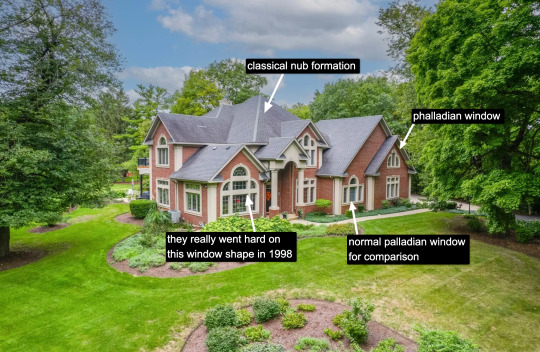
(This is almost a shame because at least this house is mildly interesting.)
If we return to the basic form of both houses, they are essentially the same: a central foyer, a disguised oversized garage, and an overly complex assemblage of masses, windows, and rooflines. No one can rightfully claim that we no longer live in the age of the McMansion. The McMansion has instead simply become more charmless and dull.
When HGTV and the Gaineses premiered Fixer Upper in 2013, it seemed almost harmless. Attractive couple flips houses. Classic show form. However, Fixer Upper has since (in)famously ballooned into its own media network, a product line I'm confronted with every time I go to Target, and a general 2010s cultural hallmark not unlike the 1976 American Bicentennial - both events after which every house and its furnishings were somehow created in its image. (The patriotism, aesthetic and cultural conservatism of both are not lost on me.)
But there's one catch: Fixer Upper is over, and after the Gaineses, HGTV hasn't quite figured out where to go stylistically. With all those advertisers, partners, and eyeballs, the pressure to keep one foot stuck in the rural tweeness that sold extremely well was great. At the same time, the network (and the rest of the vernacular design media) couldn't risk wearing out its welcome. The answer came in a mix of rehashed, overly neutral modernism -- with a few pops of color, yet this part often seems omitted from its imitators -- with the prevailing "farmhouse modern" of Magnolia™ stock. The unfortunate result: mega-ultra-greige.
Aside from war-mongering, rarely does the media manufacture consent like it does in terms of interior design. People often ask me: Why is everything so gray? How did we get here? The answer is because it is profitable. Why is it profitable? I'd like to hypothesize several reasons. The first is as I mentioned: today's total neutrality is an organic outgrowth of a previous but slightly different style, "farmhouse modern," that mixed the starkness of the vernacular farmhouse with the soft-pastel Pinterest-era rural signifiers that have for the last ten years become ubiquitous.
Second, neutrals have always been common and popular. It's the default choice if you don't have a vision for what you want to do in a space. In the 2000s, the neutrals du jour were "earth tones" - beige, sage green, brown. Before that, it was white walls with oak trim in the 80s and 90s. In the 70s, neutrals were textural: brick and wood paneling. We have remarkably short memories when it comes to stylistic evolution because in real time it feels incremental. Such is the case with neutrals.
Finally, the all-gray palette is the end logic of HGTV et al's gamified methodology of designing houses with commodification in mind: if you blow out this wall, use this color, this flooring, this cabinetry, the asking price of your house goes up. You never want to personalize too much because it's off-putting to potential buyers. After twenty years of such rhetoric, doesn't it make all the sense in the world that we've ended up with houses that are empty, soulless, and gray?
A common realtor adage is to stage the house so that potential buyers can picture their own lives in it. In other words, create a tabula rasa one can project a fantasy of consumption onto. Implied in that logic is that the buyer will then impose their will on the house. But when the staged-realtor-vision and general-mass-market aesthetic of the time merge into a single dull slurry, we get a form of ultra-neutral that seems unwelcoming if not inescapable.
To impose one's style on the perfect starkness is almost intimidating, as though one is fouling up something untouchable and superior. If neutrality makes a house sell, then personality - at all - can only be seen as a detriment. Where does such an anti-social practice lead us? Back to the house that may or may not exist.
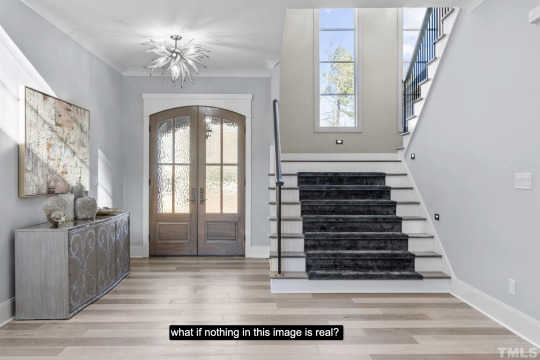
In my travels as McMansion Hell, I've increasingly been confronted with houses full of furniture that isn't real. This is known as virtual staging and it is to house staging as ChatGPT is to press release writing or DALL-E is to illustration. As this technology improves, fake sofa tables are becoming more and more difficult to discern from the real thing. I'm still not entirely sure which of the things in these photos are genuine or rendered. To walk through this house is to question reality.

Staging ultimately pretends (sometimes successfully, sometimes not) that someone is living in this house, that you, too could live in it. Once discovered, virtual staging erases all pretensions: the house is inhabited by no one. It is generally acknowledged (though I'm not sure on the actual statistics) that a house with furniture - that is, with the pretense of living -- sells easier than a house with nothing in it, especially if that house (like this one) has almost no internal walls. Hence the goal is to make the virtual staging undiscoverable.
If you want to talk about the realtor's tabula rasa, this is its final form. Houses without people, without human involvement whatsoever.
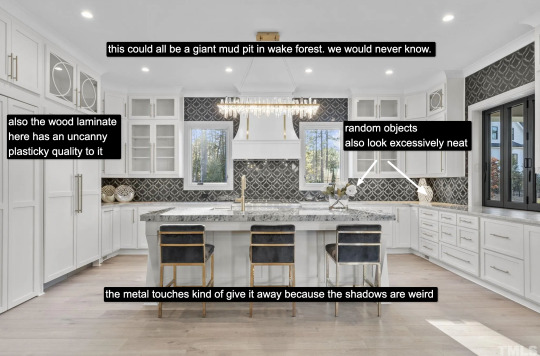
But what makes this particular house so uncanny is that all of these things I've mentioned before: real estate listing photography, completely dull interiors and bland colors all make it easy for the virtual furniture to work so well. This is because the softness of overlit white and gray walls enables the fuzzy edges of the renderings to look natural when mixed with an overstylized reality. Even if you notice something's off in the reflections, that's enough to cause one to wonder if anything in the house is real: the floors, the fixtures, the moulding, the windows and doors.

This is where things are heading: artifice on top of artifice on top of artifice. It's cheap, it's easy. But something about it feels like a violation. When one endeavors to buy a house, one assumes what one is viewing is real. It's one thing if a realtor photoshops a goofy sunset, it's another to wonder if anything in a room can be touched with human hands. I won't know what, if any, part of this estate costing over 2 million dollars actually exists until I visit it myself. Perhaps that's the whole point - to entice potential buyers out to see for themselves. When they enter, they'll find the truth: a vast, empty space with nothing in it.

The better this rendering technology gets, the more it will rely on these totally neutral spaces because everything matches and nothing is difficult. You are picking from a catalog of greige furniture to decorate greige rooms. If you look at virtual staging in a non-neutral house it looks immediately plastic and out of place, which is why many realtors opt to either still stage using furniture or leave the place empty.
Due to the aforementioned photography reasons, I would even argue that the greigepocalypse or whatever you want to call it and virtual staging have evolved simultaneously and mutualistically. The more virtual staging becomes an industry standard, the more conditions for making it seamless and successful will become standardized as well.

After all, real staging is expensive and depends on paid labor - selecting furniture, getting workers to deliver and stage it, only to pack it back up again once the property is sold. This is a classic example of technology being used to erase entire industries. Is this a bad thing? For freelance and contract workers, yeah. For realtors? no. For real estate listings, it remains to be seen. For this blog? Absolutely. (Thankfully there is an endless supply of previously existing McMansions.)

The thing is, real estate listings no longer reflect reality. (Did they ever to begin with?) The reason we're all exasperated with greige is because none of us actually live that way and don't want to. I've never been to anyone's house that looks like the house that may or may not exist. Even my parents who have followed the trends after becoming empty nesters have plenty of color in their house. Humans like color. Most of us have lots of warmth and creativity in our houses. Compare media intended for renters and younger consumers such as Apartment Therapy with HGTV and you will find a stark difference in palate and tone.
But when it comes to actually existing houses - look at Zillow and it's greige greige greige. So who's doing this? The answer is real estate itself aided by their allies in mass media who in turn are aided by the home renovation industry. In other words, it's the people who sell home as a commodity. That desire to sell has for some time overpowered all other elements that make up a home or an apartment's interiority to the point where we've ended up in a colorless slurry of real and unreal.

Fortunately, after ten years or so, things begin to become dated. We're hitting the ten year mark of farmhouse modernism and its derivatives now. If you're getting sick of it, it's normal. The whole style is hopefully on its last leg. But unlike styles of the past, there's a real, trenchant material reason why this one is sticking around longer than usual.
Hence, maybe if we want the end of greige, we're going to have to take color back by force.
If you like this post and want more like it, support McMansion Hell on Patreon for as little as $1/month for access to great bonus content including extra posts and livestreams.
Not into recurring payments? Try the tip jar, because media work is especially recession-vulnerable.
10K notes
·
View notes
Text

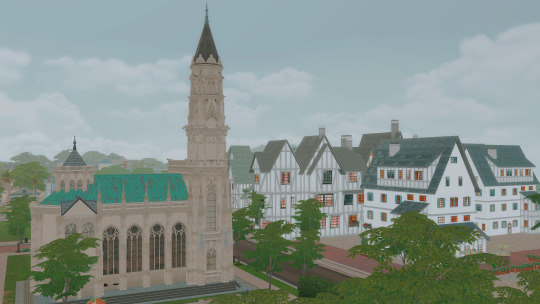
As the guests all gathered around Margaret and George to congratulate them, Frankie stepped outside for some fresh air.

"Here you are!" called Margaret happily as she left the church, "I wondered if you had used my wedding day as a chance for you to run off into the night!"
Frankie smiled sadly, "I wish."
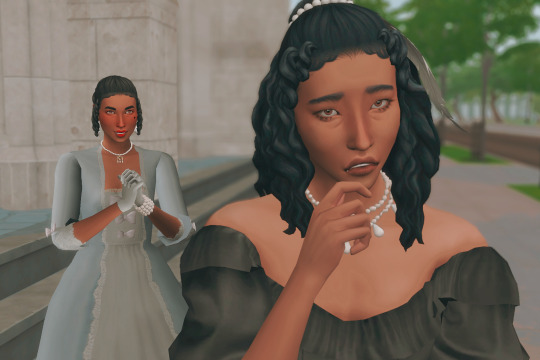
Margaret's face turned serious, "Do you, really?"
"What?"
"Do you mean that? Do you really wish to leave? Go and live your dream of sailing the sea? Even after all this time?"
"No, Mags, you were right. I'm all talk. I could never leave here. I have no money, no real world skills, no idea even where the nearest docks are."
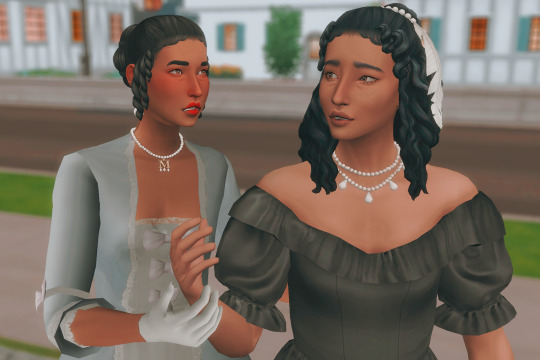
Margaret frowned and thought silently for a few minutes. Then, she began to remove her jewellery, "the nearest docks are in Brindleton Bay. You will need to learn some sort of real world skill quickly, like fishing or handiness -" Her tone was serious and business-like.
Confused, Frankie asked, "Mags, what are you on about?"

"And I would advise finding a job, too," continued Margaret, "So that you can keep yourself fed and get a roof over your head. Here, take these."
Margaret had removed her pearl earrings and bracelet and put them in Frankie's hands, "Selling these and the jewellery you're wearing now should get you enough to get away from England. Perhaps even to buy yourself a simple home in whatever destination you choose."
Frankie was still shaking her head, "Maggie, what are you doing?"
Tears built in Margaret's eyes as she began to remove the necklace around her neck, "I would ask, though, that you do not sell this one. Peggy gave it to me when I was a child. She told me it would be a way for me to remember that she would always love me and always be with me. I want you to take it and remember that both Peggy and I love you and will always be with you."
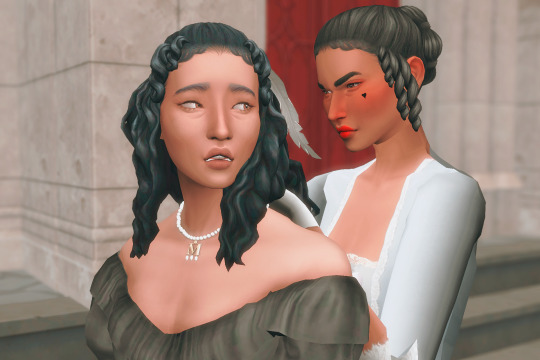
Frankie started to cry as Margaret tied the necklace around her neck, "Mags, I - I can't."
"Yes, you can," said Margaret softly, "You were always the only one of us that could. You should go now, before mama notices you are missing."
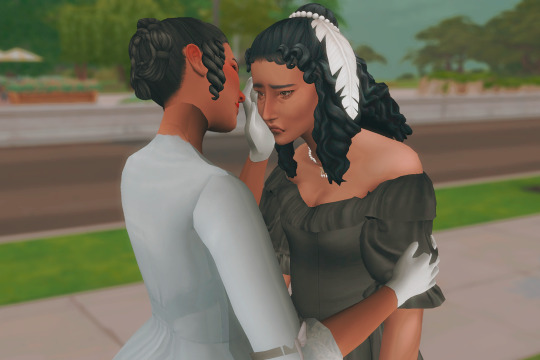
Frankie grabbed her sister and clung tightly, unable to give words to everything she was feeling.
"Never grow up, Frankie," Margaret whispered in her sister's ear.

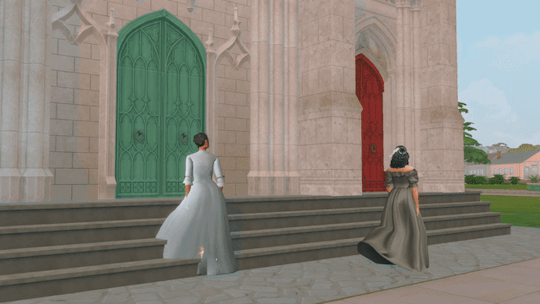
Start (Iron Age) | Start (Roman Britain) | Start (Anglo Saxon) | Start (Medieval) | Start (Tudor) | Start (Stuart)
Previous | Next

29 notes
·
View notes
Photo

Fairy tale like house in Visalia, California was built in 1931, has 3bds. 4ba. and is listed for $639K. Apparently, it’s been used in many photo shoots and videos, also.


Since it looks like a gingerbread cottage from the outside, I didn’t expect it to look this fancy inside. Apparently, the house was built as a Tudor style home, but the owner that bought it in 1960 turned it into a Victorian Estate.



Look at this gorgeous bar. I wonder if the stools come with it. The architecture in this home is amazing, and look at the floor.

Even the sink under the bar is amazing.


Look at the opening for the spiral stairs. Notice that on the way down, you also have the option of sliding down a brass pole.

Greek columns line a small sunken seating area.



Well, this is a cozy little area before the fire- built-in benches, stained glass, and for some reason, a cute fire hydrant acting as a newel post.

Here’s another sitting room.

You can also enter the house from this side door- notice the vintage doorbell.

This home is full of surprises, b/c this is the kitchen.


Love the pitched ceiling, leaded glass and the banquette.


Aren’t the cabinets spectacular?


And, that stove.

What a lovely sunny dining room.


I can’t believe this glorious home is $639K. I would expect it to be over $1M. Look at the size of this gorgeous bath.


Can you believe how beautiful it is?


Here we are upstairs on the landing. Look at all the room up here.

One of the bedrooms has a window seat with a pretty stained window. And, look at that coffered ceiling.



Up to the 3rd level. Look at those windows.


There’s a lovely family room with a fireplace up here.


And another amazing bath.

Such a pretty home.





Isn’t the garden stunning?

And, here’s the garage and carport.
https://www.zillow.com/homedetails/1015-S-Giddings-St-Visalia-CA-93277/16239524_zpid/
#fairytale house#modern victorian architecture#midnight dreamer house#modern houses#house tours#home tour
233 notes
·
View notes
Text
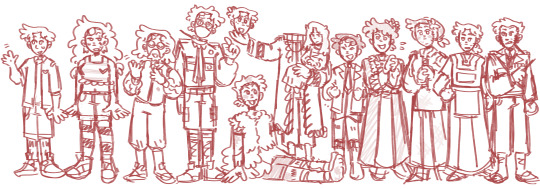
forgot to post this doodle SAY HELLO to the shittiest bbc ghosts/mcyt au ever conceived, thankyou @/luigra for helping hehe
i have A LOT to say so its going under the cut this is soso silly
basic bbc ghosts plot: A young woman inherits a huge mansion estate in england from a dubious familial connection and moves in with her husband. They plan to renovate the manor and guesthouses to make into a hotel/venue, but when she falls out a window and almost dies, she comes back to life with the ability to See Ghosts. With the house being very historic, there are quite a few interesting characters (the falling out the window thing might be their fault, actually). Hijinks ensue.
———
CLEO: Cleo is the Allison of the story, she inherits the house and falls out the window, now.. undead(?) they can see and interact with the cast of Ghosts they’re now stuck with. Making ZombieCleo one of the Alive characters was too funny, sorry.
SCOTT: Scott is Mike!! Cleo’s best friend/partner/chosen soulmate (like in double life), he Cannot see the ghosts but completely trusts they exist.
They get up to various antics as they try to renovate and market the place, usually while being hindered or helped by the ghosts. I haven’t thought of a good pun on the name Button House yet though..
The ghosts are not all from any specific series, but a selection of ghosts/dead characters from multiple mcyt sources ^^
JOE: Joseph Hills takes the role of Thomas Thorne. He is a dramatic regency era poet who mostly follows Cleo around, trying to impress her with his… unique poetry, that was considered before his time. Their ghost theming comes from Beetlejhost of course.
RANBOO: Ronald Booth is Pat, a 1980’s Scout Leader. To be honest, this is just because Ranboo is very associated with the 80’s aesthetic and can fit the silly yes-man subordinate role, and of course was a ghost on the dsmp (Boo).
BDUBS: Bdubs is Robin!! A caveman who lived on the land well before the house was built. He’s seen it all, which fits Bdubs’ storyteller theme!! This is also just a fun visual choice because instead of wearing animal furs he gets to wear a big mossy coat. He also talks in a quite a unique and funny way which could replace how Robin talks like. Yknow, a Caveman. There was also a tiny bit in.. last life? Where bdubs was a ghost? (We were running out of ghosts at this point.)
SLIME: Charles Slime is Humphrey Bone, a headless tudor nobleman!!! Slime has a pretty constant track record of dying dramatically in mcyt (dsmp, epic smp, slimecicle cinematic universe) hence getting to be a ghost here. He has a lot of comedy that i think fits pretty well with being a ghost and with the visual humour of having your body separate to your head <3
FLIPPA: Juanaflippa as Jemima!!! I had to get one of the Eggs in here, even if i dont know much about qsmp at this point its just too perfect for one of them to be Jemima, since we have Charlie why not have Juanaflippa ^^ This can fit the common bbc ghosts fanon of Humphrey being found family for Jemima, with Charlie and Flippa’s father-daughter relationship. Creepy little singing ghost girl!!!
QUACKITY/MEXICAN DREAM: Yeah ok we were really running out of mcyt ghosts at this point, if you dont know anything about the dsmp you would probably think im making this up- uh, quackity plays him, he died and became a very prominent dsmp ghost. He takes the role of Julian as a 90’s politician character (like quackity/md in el rapids etc) here. I GUESS.
GHOSTBUR: Im pretty sure that while alive Kitty didnt blow up a country or whatever but the innocent and kind character of ghostbur fits the role of Kitty pretty well, with both having poor/inaccurate memories of their lives and being very sweet. A georgian noblewoman! Instead of Kitty he’d be called Willy or something. That way one of the ghosts can still have an innuendo name. Thats important.
JIMMY: Jimmy (James) as Mary. A stuart era peasant who got burned in the witch trials. He could still have the power to make people smell smoke, i think it fits the canary thing a bit. AND SPOILERS FOR BBC GHOSTS, Mary being the First Ghost of the main group to get.. sucked away is just too perfect. While never explicitly being a Ghost, Jimmy has such a connection to death that i think im justified.
PIX: Pixie as Fanny!!! He used to own the house many years ago and is now a ghost that really wants it to be perfectly historically preserved. Pix was a ghost in empires s2 and an archeologist who wanted to preserve history of course, so this fits the really proper and old fashioned personality of Fanny pretty well. Also her love of animals fits pix having the ghost cat and the dodos…
SCHLATT: Schlatt as The Captain, a repressed gay ww2 Captain who never actually saw any combat. He can fit the leader role that the Captain does, especially the fact that he just assumes himself the leader, and the others kind of don't take him seriously. Schlatt was a ghost, Glatt, on the dsmp! He will be a bit less.. nice? Than the bbc ghosts captain, but could still have a good bit of development.
bonus convex as the plague ghosts, vex are kind of ghosty, right?
#art#au#mcyt#bbc ghosts#SORRY TO fans of either of these that dont know what the other is#but these r like two of my favourite medias#the thing about all the bbc ghosts characters (most brit comedy characters actually) is that they are all terrible#in their own special ways. So when i assign a mcyt to a character.. it is only out of love <3#dream smp#<- for blacklist
33 notes
·
View notes
Note
In you other blog you talked about your ideal JS/Seymours tudor adaption.May i ask you if you have some ideas on how to characterize Js and her family?
so! i have unfortunately lost my entire mind writing this. hope you can understand. i’ve just done the parents for now, and will get around to adding thoughts on the rest later!
john seymour
i think it’s interesting that he spent “more than a year in limbo” wrt his title/inheritance — with his father dying in mid may 1492, and there being an inquisition to confirm an heir to somerset a few weeks later. (was there some uncertainty/challenge over succession?) he doesn’t seem to have been granted his whole inheritance (including his mother’s lands) until 20 december 1493. this early instability could lend itself to characterisation; giving john a crucial wound that would propel him within the narrative.
john was the eldest son of his parents, his mother the first wife of his father, yet the potential uncertainty in his claim to somerset could well be characterised as a fundamental insecurity. this would be compounded by the loss of his first born son (in 1510, not even a year later he would be listed as one of the pallbearers and mourners at the funeral of henry’s son in 1511, as well as being listed as one of the mourners), losing another son who dies young, and two more children in 1528 to a pandemic. of course, he had other children — but it’s still the loss of children, within a patriarchal and (late) feudal system.
no doubt it would impact his relationship with his family, and peers. that same sense of instability, within a transactional and increasingly competitive system, would surely define his career. numerous complaints against him can be found in star chamber cases; female plaintiffs brought forward accusations that john, sheriff and justice of the peace for wiltshire, was undermining them. one woman accused john of “orchestrating the disruption to her property [...] her jointure”, and john has been described as a man “who had a reputation for being overbearing”. david loades describes his career as marked by “periodic litigation”. he also potentially had what loades describes as “a falling out with wolsey”, where personal and political perhaps merged — because in mid 1530 john served on the commission to assess what lands and goods wolsey held in wiltshire, and more definitely he had some kind of dispute with william essex in 1528 (the same year two of his children died), describing him to thomas cromwell as “enemy essex” in 1531. then, of course, there's the suggestion that he had a quasi-incestuous affair with his daughter-in-law, katherine filliol, although of course unsubstantiated contemporaneously, and only suggested in the 17th century marginal note (“repudiata, quia pater ejus post nuptias eam congovit”).
so, domineering chauvinism, entitlement, and a deep-rooted insecurity. ambition, but without creativity; this is not a man noted for revelry. he impresses henry vii enough for honours, and is on good terms with henry viii. he’s competent and successful militarily — knighted for valour at blackheath — and he was made knight of the body by the end of henry vii's reign. he was present at the field of cloth of gold in 1520 (where he was permitted eleven servants when the standard allowance for knights was four), and accompanied henry viii to meet emperor charles v in 1520, and was present when charles visited england in 1522. david loades suggests that john might have been something of a father figure to the young henry viii. he was on good terms with thomas cromwell, and in 1532 he was created a groom of the privy chamber, “perhaps at cromwell's intercession, because we know that he was infiltrating his friends into privy chamber positions by that time”. this is the man who built a huge estate, fit to accommodate a king since henry viii visited multiple times, only for wolf hall to be abandoned within a generation. this is the man who dies before seeing his daughter become queen of england. sound and fury signifying nothing.
for me, the seymours truly are the meeting point between the irrational agitation and recklessness that comes with mediocrity and stagnation (they’re gentry but they’re not standouts, everything about them is neatly acceptable but boring and unadventurous/unambitious) and the intense anxiety and paranoia of deep-rooted unsettled instability. all of this is something that festers under a feudal, patriarchal system. this, for me, would be the thematic throughline for the family — but would be exemplified in john seymour.
primary sources: david loades, the seymours of wolf hall
margery wentworth
it’s rather sweet that john was granted wardship to her father, before they were betrothed to each other. following her birthdate being presumed to be in the late 1470s, she would have been in her mid-teens when she married john. so, a young match. it’s not known exactly when her eldest son, john, was born but edward was born around 1500 and the couple have a pretty reliable pattern of annual pregnancies following, so it’s reasonable to assume that john was born around 1599. given that they married in 1494, we can maybe infer that they waited before fulfilling their conjugal obligations. when he died, she never remarried.
she's descended from edward iii, so “it was through her mother that jane seymour was able to claim a drop of royal blood”, as well as kinship to other notable families. the pair would have been raised and educated under margery's parents: her father was henry wentworth, himself the only son and heir of philip wentworth. henry would be taken prisoner (released two years later), and his father philip would be executed, as part of the lancastrian army, in 1464. so, that similar sense of uncertainty carries over to margery's family too, as well as a connection to the war of the roses and the destabilising, disruptive environment that fundamentally exposed the weaknesses of the system they worked within. henry would receive rewards under henry vii, being invested as knight of the bath and knight of the body, and possibly introduced his son-in-law to court and nurtured his early court prospects. it is likewise potentially what established margery at court, where she seems to do well for herself. margery and her husband were on a pardon roll when henry viii succeeded to the throne, for reasons that are unknown, and she would ultimately become the muse of the romantic court poet, john skelton.
surely there must have been something about her, for her to have been singled out as an inspiration for john skelton. compared to flowers (primrose — a symbol of youth, new beginnings, in antiquity a symbol of aphrodite, and columbine — symbolic of doves/the holy spirit), margery is described as “benign, courteous, and meek”, so an idealised sixteenth century woman. he describes her as virtuous (“virtues well comprised”), with “wordes well devised”. that and the fact that she was a muse for john skelton lends itself to her being a successful gentry lady if not much of a court presence — indeed, she doesn’t seem to return to court, even when her daughter becomes queen. but what is charming is the fact that margery was a romantic ideal for the man who would tutor her future son-in-law; bringing it full circle to when margery hosted henry viii at wolf hall in 1535, about to court her daughter jane, would be delicious.
so that is the base of how i would characterise margery: “never a prominent figure […] content [with] supervising the education of her children and running the household” at wolf hall. considering wolf hall would host henry and queen anne boleyn in 1535, it is reasonable to conclude she was confident in this role. beyond this, i think we could reasonably characterise her as stolid, and practical: her daughters received “the solid teaching befitting a future country gentlewoman rather than that of a great lady in the making”, including music, hunting, embroidery and management of the estate. her daughters wrote in (it seems like) secretary hand, with elizabeth seymour’s described as “neat and confident signature in a masculine ‘secretary-hand’, not the usual female sprawling italic” by diarmaid macculloch. so, it would not be unreasonable to characterise her as pragmatic, or sensible. i'd love to tie that into the nature imagery that lends itself to the seymours as caretakers of savernake forest, which is followed up with subsequent allegories between jane seymour and nature (trees, branches, flowers — tudor roses blooming on seymour hawthorn bushes), especially in opposition to the popular idea of the boleyn ‘continental gloss’.
she would ultimately lose four children young, and later outlived jane and thomas. indeed, she endured several losses in quick succession, with two children lost in 1527, her husband dying in 1535, and jane dying in 1537. she witnessed thomas’ disgrace and execution, the loss of her daughter-in-law katherine parr (so reminiscent of jane's death) as well as the early death of her granddaughter mary. she also witnessed edward’s fall from grace. it feels like a very rapid familial rise and fall, not with a bang but a whimper.
it’s not clear what her relationship was like with her family. her will lists her son-in-law, clement smith, as a witness, which suggests that she was living with him and her youngest daughter, dorothy, at the time of her death. her will details that she made mention of several family members. reciprocally, upon her death an act of the privy council details that her son edward proclaimed his “natural love towards [his mother]” in requesting to “honor her funeral remembrance as his own affection might have leaded”, or otherwise commemorate her with a period of formal mourning and a state funeral, which was snubbed out of pettiness towards edward, at this point in disgrace. it suggests genuine affection for his mother, the king’s grandmother. it makes it poignant, then, that edward seymour was not included in his mother’s will. it’s also not clear if edward vi was particularly close to margery, but the council dictated that “private men should reserve their private sorrows to their own houses, and not to dim the gladsome presence of their prince with such doleful tokens”.
primary sources: elizabeth norton, jane seymour: henry viii's true love; william seymour, ordeal by ambition
#they could tell boccaccio a tale; those sinners at wolf hall#john seymour#margery wentworth#seymour adaptation tag
7 notes
·
View notes
Note
Do you have thoughts on the concept on Jedi lineages and lineage repudiation that crop up in fic? I get the appeal of fic writers focusing a lineage, but I find the repudiation concept legitimately squicky. The ideas that 1) a Padawan can grow up considering their lineage to be their family, only for one day their current or former Master decide to repudiate them and immediately have them stricken from their lineage, and 2) the rest of the Jedi both within and outside of said lineage are totally cool with this process and this entire system, not only make the Jedi seem horrible but also go against the idea of the Jedi as fair, compassionate, or even a family. I’m not trying to shame fic writers or readers for what they like, but turning the Jedi into some kind of backstabbing royal Tudor court, where it’s implied the Jedi don’t truly care about each other and thus continue to allow this system that hurts other Jedi for seemingly no purpose, both frustrates and saddens me.
I’ve been thinking about this and I’m having trouble articulating where I stand on it, in part because I haven’t read a lot of fic that deals with Qui-Gon and Feemor’s relationship, and the fics I have are ones where it wasn’t that the Jedi considered Feemor no longer part of the lineage, but that the hurt feelings there led to estrangement and they just didn’t connect.
It’s complicated because here’s what we’re working with:
- Emphasis Jedi lineages are a fan-created thing in the first place
- Feemor literally only appears in one issue of one comic, and barely mentioned in any reference books
- I don’t think there’s any official repudiation in the source material, just that Qui-Gon personally dismissed his training of Feemor
I like the concept of Jedi lineages in fanon because it’s worldbuilding that’s coming from a good faith place and it gives me tons of fun interaction fic, like I am so hungry for Obi-Wan & Ahsoka fic or Obi-Wan & Dooku fic or Anakin & Yoda fic, so if lineages are a thing in fic and they’ll steer more people to writing connections between those characters? Bring it on!
In the source material itself, I don’t think lineages are a thing and I would say it’s probably because the Jedi don’t want to build dynasties--and looking at what, say, the disaster lineage could do if they built a dynasty? that’s probably a smart idea! XD--but also because we just don’t see that many Jedi characters and the ones we do are seen through the eyes of the main characters. The Jedi as a concept are there to support Anakin’s story, to be a foil for his character. That’s why we hardly know anything about most of the Council’s time as Padawans, for example.
So when trying to mesh the fan-created concepts of official lineages within the Jedi Order (and every author having their own take) with Feemor’s limited appearances and limited backstory and out-of-order storytelling (ie, trying to map Feemor’s story from 2011 onto already-told books that came out in 1999, that of course wouldn’t have mentioned Feemor because he didn’t exist yet), it gets messy and you have to come up with reasons why he wasn’t mentioned that weren’t intended by the material written before. And people just kinda gotta do the best they can with that, which ends up with some messy worldbuilding sometimes and implications that probably aren’t always intended.
I haven’t read the kind of fic that you’re talking about (though, I’m sure it exists! it’s just not my personal reading experience, especially given the kind of fics I prioritize reading first) and I can’t help but think that a lot of it is coming from Doylist factors rather than Watsonian factors, so I chalk it up to that.
Any repudation fic I’ve read has been “Qui-Gon dismissed Feemor, Feemor felt unwanted and so he chose to keep his distance, other Jedi let Feemor make his own choices”, not “Qui-Gon dismissed Feemor, so he was no longer considered part of that lineage by the other Jedi”, but to be honest, if I ran into the former, considering the whole thing is fan-created, I would probably just close the fic and not read any more of it as soon as that vibe came up.
Another big problem here is that, for all that Star Wars feels massive, the worldbuilding we have on the Jedi Order is actually super thing, we don’t have that many characters or know their relationships to each other and they’re spread out across a bunch of different continuities. So, if we consider Feemor an estranged son of Qui-Gon’s, well, he has no interaction with Qui-Gon, but who would he have interaction with that we know of from Qui-Gon’s immediate “family”? Who would be Qui-Gon’s brother Padawan in that continuity? Who would be his Cousin Padawan in that continuity? Who are the other “family” members that Feemor could interact with even if he’s estranged from Qui-Gon? The lineage is so thinly populated that we just don’t have those characters for Feemor to then go interact with other parts of his “family”. So, he just goes to hang out with other non-”family” members and the other Jedi respect his choices, so it comes across like they’re fine with Feemor being cut out of the “family”, when there’s other (Doylist) stuff going on.
(”Family” in quotes because I kind of dislike putting the Jedi Order in such a 1:1 relationship with biological family dynamics, when they lean more towards the form a communal family. Hopefully you guys know what I mean!)
But that’s based on my experience of that kind of fic, which may be vastly different from yours! It’s hard for me to form strong opinions on it, without having read more of it, though, god knows I do enjoy examining Doylist effects on fic like this! 😂
63 notes
·
View notes
Text
Chapter One
“Elmsbury-Gallows Welcomes Responsible Drivers!”
***
Elmsbury-Gallows was a brown town. Each leafless tree as you drove in on Elmsbury Town Way was a particular shade of coffin-mahogany brown; as you turned into Main Street, each of the once colourfully-painted shopfronts that lined either side were now peeling to reveal the eaten-at browning wood beneath, littered with pockmarks in small clusters like lotus seed pods; the pavement, if you could see it through the constant layer of fog, was constructed from large concrete squares- once intended to be reminiscent of limestone but now weathered to the same colour as the shell of an old computer, and littered over with squashed chewing gum and orange cigarette filters. Each house down on Mansfield Estate through to Abbey Way through to Forest Estate through to Church Street could have been tranquil, perhaps even quaint, late Tudor era buildings, but had been eaten alive by the council’s insistence on updating the architecture instead of preserving it: rows of brown brick houses with brown brick rooves and brown brick driveways. On the opposite side of Main Street sat Hopkins Village, a miniature conurbation growing like a benign tumour out of the trees like some vintage painted plasticine toy village, quaint and perfect and smug. Whether it be Eastbound or King James’s, the small local parks all looked the same in the end: the grass pack-hardened by frost in the winter, and burned dry and crisp by the summer heat: there was never really any sun in Elmsbury-Gallows.
The town sat somewhere between Leicester and Derby, tucked away into one of the secret compartments of conservative brush and shrub present in the urban fells of North-West Leicestershire. No major, or working, train lines ran through or nearby, and all four roads that led up into Elmsbury were winding, thin B-roads, engulfed by a canopy of bended, ancient trees acting as walls to the forest that the town had been apparently built on top of. A road-sign was the only thing announcing its existence, though that had been pulled deep into the bushes around it, halfway down a ditch until the once sweet and quaint design of a ripe, green wych elm was now three-quarters obscured and peeling like sunburn. It was the kind of town you could only find if you looked for it, or if you put the postcode into your SAT-NAV.
At its founding, it had been a safe haven for Catholics during the dissolution of the monasteries, being named after the great wych elm tree that stood a little way out from the original settlement. Then, when Henry VIII’s soldiers found the town, they massacred its peoples: anybody who would not turn to Anglicanism was hanged from the branches of that tree; that was when it was renamed to ‘Elmsbury-Gallows’: a sort of morbid joke that the soldiers would tell one another in taverns and alleys. Matthew Hopkins’s witch hunt would find it next, after the construction of a fortified manor in the forest surrounding for Royalist soldiers, and once again the great elm tree served as the execution spot of twenty-or-so women. That’s what it said on the pamphlets in the local library anyways.
After the passing of centuries, that very same tree with its crooked and wrinkled branches curling upward to the clouds, was ripped from its roots to build a coal mine in 1980, alongside the construction of Elmsbury Common, the little mining community- which Mr Spencer was told was separate from Elmsbury Town, that had stood for damn near four-hundred and fifty years beforehand. However, both Elmsbury Town and Elmsbury Common came together as Elmsbury-Gallows; it all appeared very important to the patrons of the King Henry he had talked to that lunchtime. The wych elm had stood for an eternity before any of the little towns that came together as one big town even acknowledged its existence. And then it was gone- plucked from the ground as easily and painfully as a single hair from beneath the nose of a scowling lady.
Only five years later, the mine had collapsed due to a tragic underground flash flood, killing all forty workers who had been sent down there- and now on this present, humid August evening, they were opening it back up.
“Here to watch the big reveal?”
Mr Spencer looked up from the pamphlet he was reading, his eyes met by a man of medium-height and middle-age, with a short crop of receding brown-turning-grey hair spiralling atop his head; he peered a little downward at Mr Spencer, a shorter than average man himself, through his pair of tiny round spectacles propped up on the bridge of a pig-like nose, the lenses of which magnified his eyes into two great beady pits in the midst of his otherwise very ordinary face. He smiled, placing one hand in the pocket of his black overcoat and using the other to absently scratch his priest’s collar. Altogether, he had the forgettable face of a good man.
“Reverend Fairfax?”
“Please, call me Jim, everyone does.” The man smiled, showing rows of square, eggshell-white teeth.
Jim the Vicar. That’s what he had heard the locals refer to him as anyways: nobody here seemed to be all that caught up in formalities. Mr Spencer laughed nervously, “Ah- yes, yes, very sorry Revere— Jim.” The supervisor felt his mouth dry up a little. It was probably the heat- the town got particularly hot this time of year, according to Mr-Graham-Sparrow-to-you-sir from the King Henry, which Spencer found bemusing since he hadn’t really seen the sun all day- as if the whole town were dough left to prove under a tea towel.
“So you’re here for the big reveal?” Jim the Vicar asked again.
“Oh! Yes, yes I’m, uh, I’m the supervisor of the whole… operation, so—”
“Ahh, of course- we had to get in you sophisticated lot to do it this time.”
Mr Spencer didn’t quite know what he meant. Jim continued, “See back in ’94 we got a bunch of our local lot to try this whole operation,” he chuckled, gesturing with a wiggle of his fingers in the direction of the workmen around the old mine,“which didn’t go over quite as well as we’d have liked, see, it weren’t safe for ‘em and all.”
The other man nodded, his eyes flitting over to the adit bandaged in yellow caution tape, “I see…”
“Though,” Jim continued, “this’d be the first time actually getting the thing open since the collapse.”
“Oh?”
“Aye, indeed, I was a young man here when it happened,” Jim rocked back and forth on his feet, looking up as he recalled the story, “only about eighteen, maybe nineteen since I’d been sworn into the Church already,” he redirected his gaze back to the supervisor’s pallid face, “was lucky my brother weren’t down there that day, eh?”
He said it far more lightheartedly than Spencer would’ve liked- as if it were a day at work where his brother had missed a fire drill, not having escaped a slow suffocation under a hundred tonnes of dirt and rubble, deep inside the belly of the town. Again, he found himself glancing at the mine, “yes, well,” he looked back to his new companion, “we’re just renovating it so they can put the museum in.”
“That you are- and I know you are,” Jim said kindly, his black eyes wet from the haggard, muggy air, “I am the deputy head of the Parish Council, you know.”
“Of course, sorry, ah, I- I didn’t mean to sound all—” he waved his hands around as if that would conjure up the right words like some form of vocabulary magician, “—well, all that.”
“I think they’re opening it up now,” Jim started off towards the caution tape barricading the workers from the onlookers, taking strides across the uneven ground that somehow didn’t stop him from keeping to his constant height. Spencer followed him- it looked like it was going to rain.
***
The black umbrellas bloomed open into a mushroom-like cluster around the edge of the tape, the small crowd creating their own tent to which they were the poles. The drizzle had become heavier, pattering down onto the open parasols creating silver nebulas and shooting stars which each rolled off as another raindrop came; the sky had darkened to a navy blue- had there been a sunset? Mr Spencer wondered to himself, he probably had just not noticed it whilst talking to Jim. He was stood beside the Reverend, the only person there who was not wearing a Stabilo-yellow safety vest- apparently they had just neglected to give him one, and he had neglected to ask. A group of four or so workers gathered at the adit- drills in hand- ready to pry out the screws from the rusted, brittle iron bars that had kept it closed since 1994.
Huh, odd, Mr Spencer thought, the bars were rusted far beyond the apparent age of the screws, which appeared to be silver, oddly shiny. It must be the light; each workman had on a head-torch, which illuminated tubes of rain as they panned around: it must be that the rain had wet the screws making them appear to be shiny and new when the light fell on them. Mr Spencer suspected that in reality, they were just as decrepit as the bars. Which they had been that morning when he inspected them- hadn’t they? Honestly for the life of him he couldn’t quite remember. They probably were.
The whirring of the drills wrenched Mr Spencer from the inside of his head as they pulled the little metal rods loose like blackheads from pores out of the rotted, softened wood of the adit. The rain was like a drumroll before the big reveal, and with a groan from the four men surrounding it, the bars were finally off.
Cold hit Mr Spencer from the mine- not hard or fast, rather it crept up him, starting at his knees before ending on the tip of his nose and in the corners of his eyes. It was the cold of something ancient- the kind of cold you only really feel inside a basement you forgot you had: a cold you could smell; a cold you could taste. A dusty antiquity seemed to spice it, and he twitched the feeling away involuntarily, realizing that before now, the inside of that mine appeared to be the only place in Elmsbury-Gallows the fog had not reached. It was eager to now, though, the white mist from around his ankles swirled inwards through the haggard opening- without it, Mr Spencer could have been convinced that they had opened the adit onto a solid wall of rock, even though the collapse had happened some miles down deep into the earth beneath the town; but the fog seeped downwards like worms into a blackbird’s mouth, confirming that this was the undisturbed entrance they had spent the past three days looking for.
Down, down, down, down.
He stared at that darkness- who knows for how long- watching as his eyes adjusted and he slowly became convinced that he saw movement. The blackness oozed and mixed like blood in milk, swirling around, making it difficult to notice, but obvious if you looked: if you really looked.
A familiar yet distant sensation overcame him, and though it took him a moment to pinpoint what it was, he managed to get close enough to an articulate description: it was the feeling he had when walking from his bedroom to his kitchen at night as a child. Not a fear of the dark, and not a fear of being caught by whatever his seven-year-old mind imagined was in the dark, but something else. He always made it back to his bedroom- without fail- and yet every time he stood at the top of the stairs looking down into the hallway, the light from the bathroom behind him that he always turned on so he wasn’t in complete darkness never quite reached past the fourth step down. And yet, he would descend the stairs, hand tight on the bannister, mustering up every last iota of courage that his little boy heart could manage- he knew he always survived: whatever was down there never caught him- heck, it never even chasedhim, he hadn’t even seen it.
But he wasn’t in his bedroom anymore, and he wasn’t in the kitchen yet.
A creeping anxiety made its way from the hollow of his throat to the middle of it, lodging there, wriggling and stuck as he just stared into that familiar blackness that stopped not four steps down from the opening of the mine, before the rocks closed in to an even smaller aperture only a few inches tall and wide. A prickling came at the back of his neck, as if something had its nose just above the hairs on his skin, stirring them like blades of grass with each inhale, exhale: smelling him. Spencer absent-mindedly scratched his clammy nape, his hair sticking to it from where his jacket and umbrella couldn’t shield and as soon as it had started, the feeling had gone. He was just being stupid. Staring into darkness like that, he was bound to see something. It was human to want to see something. Darkness just tends to move.
Outside him, the crowd was clapping, triumphant at the successful opening of this part of their history. The museum would bring in money to the town- at least that was the premise, and of course the goal- and they could use it to bring in tourists interested in the local history and seeing the sights of a proper English town, so long as they stayed out of the estates around Mansfield Estate and Elmsbury-Common; additionally, it would serve as reparations to the families who lost their grandfathers, fathers, brothers, cousins, and friends in the collapse. They never found the bodies- perhaps their stories would become immortalized in the museum instead: no longer forgotten.
“Done a blummin’ good job there then haven’t you!”
A thick hand clapped down on Mr Spencer’s back; he pretended not to buckle slightly. Jim the Vicar was grinning in his face, showing his tiny teeth again, telling the supervisor that he was proud the town had managed to gather up enough money for the museum, and that hopefully the town history would be remembered forever now that it was in place. Maybe they would even be able to fund the Preservational National Park and restore the manor on its grounds.
“They drink where you’re from?” Jim had started to walk, intangibly pulling Mr Spencer along with him.
“I didn’t think you were allowed to drink.” He felt the need to look back through the crowd- just to check the mine one more time. Jim let out a hearty laugh, interrupting him, and threw his head back, “That soft, eh?”
“No! No, it’s just,” Spencer corrected himself, “not me— you! You’re a priest.”
“Reverend.” Jim smiled, “and God forgives.”
***
Purple lightning cracked across the sky like the forked tongue of a great snake, illuminating the clouds as a roll of old thunder followed. Another summer storm with no rain had befallen Elmsbury-Gallows, and had turned the drizzle from the day into steam now rising up from the pavements and mingling with that impermeable fog. From her window across the street, Bellamy Cokes watched as a thin bolt of lightning broke free of the thick layer of clouds, striking the cast iron crucifix from the spire of the old Church. It was sent careening downward onto the gravel pavement. A crow cackled at this symbolic beheading. Amy revelled in how gothic this whole scenario was.
She was a tall girl, needing to fold herself up like a deck-chair to fit in her sitting spot at her window, and was composed entirely of rectangles and ridges. Her bones poked out from underneath her pale skin, and her eyes sat wide and smudged in the centre of her face like an owl’s. Her hair was dyed a box-dye jet black, and would be backcombed to the high heavens every morning into a matted bats nest. Bellamy felt that she was quite a standoffish kind of person, not really wanting to get in the way of trouble if she could help it, and used to cry when teachers scolded her. Which is what made it so ironic that her and her two friends’ favourite activity was trespassing. They preferred the term ‘ghost hunting’, but really trespassing was what it was. Her anorak hung loosely from her shoulders as she peered down into the street wondering again to herself where Kat and Trent were.
Tap!
Finally.
Bellamy nudged open her window, smiling down at the two of them on the driveway. They were holding up the makeshift window-opener to her, aiming to use it to hook her bag down before she got down. Obliging this routine, she sent down the small satchel that held her polaroid and hand mirror. She swung her feet over the window ledge, being careful not to slip on the wooden awning over the front door before slowly lowering herself as far as she could off the edge of it. Bellamy let go of the guttering and fell onto the driveway, her well-practised landing finishing with a flourish.
“Graveyard?”
Trent nodded, “Yup, got a photo and everything.”
“Who from?”
“Mike Gregory,” Kat interjected as they started to lead the group towards the Church across the road. Bellamy turned up her nose.
“He thinks it’s gonna be funny to freak us all out,” Trent started to lead the group to the other side of the street, “he forged a photo and everything.”
He held out his hand, crumpled in it was a small polaroid square; Bellamy took it, squinting in the orange glow of the streetlamps overhead.
“It’s terrible quality.”
“Really, Amy? But Mike Gregory is so well known for his impeccable artistic prowess!” Kat laughed to themself. Amy made a face at her friend before re-examining the photo, “I can’t see anything, it’s just the… the crypt, I think?”
“You have to really look, Amy.” Trent remarked from in front.
“I am looking— you look— you show me then.” She thrust the photo back toward him, and he stopped still and jabbed a chipped black fingernail to the middle of the photo, “There.”
“The crypt?”
“Yes—“
“Okay, let’s maybe not stop in the middle of the road,” Kat took their arms and guided them to the pavement outside the Church.
“There’s nothing there, Trent.” Amy squinted.
“Bro— look, Amy.”
She looked, and as her eyes readjusted to the horribly taken photo, she made it out. The photo was of the graveyard, specifically the lower level of the graveyard where the crypt for the body of Matilda the Witch sat. A yellow pool of torchlight was smeared over the front of the stone, causing an unintelligible glare to be cast over the scene. It appeared to be raining, or have been raining, and the sky was that dark twilight blue of dusk. Amy angled it up in her hand, catching it in the orange of a streetlamp. Oh, there.
From behind the crypt, wrapped around the stone were three thin, long, pale fingers, all about the same length. It wasn’t apparent at all to Amy if the fingers were disappearing behind the crypt, or emerging from it.
“Eugh,” she put the photo in her pocket reflexively.
“I know, creepy innit?!” Kat chided.
“If it’s an effect he’s actually gone and put some effort into making it.” Amy glanced into the graveyard over the gate where the three were now stood, the crypt not visible at all in the nighttime, and the glow of the streetlamps only reaching about three or four steps down into the lower level of the graveyard, “I’m kind of flattered,” she said jokingly, “But, I dunno, it just doesn’t seem like something Mike Gregory would do.”
“He’s obsessed enough.” Trent muttered.
“Yeah, it’s just…” Amy trailed off, knowing what she wanted to say but not wanting to be cruel.
“He’s not smart enough to do something like that, at least not to do it well.” Kat said it for her, “not to be rude or anything.” They added.
“So are we going in or not?” Amy asked, “I don’t really fancy running into a weird hand creature any time soon.”
“Me neither, but I do fancy smacking Mike Gregory over the head with my torch,” Trent punctuated his statement with the click of the ‘on’ switch on said torch, and pointed it into the graveyard, illuminating the crypt in a sickly pale spotlight.
***
Hopping the gate was a piece of cake, Amy always wondered why Jim the Vicar hadn’t thought to make it taller if he didn’t want any trespassers, as indicated by the laminated A4 paper with red comic sans text reading “NO ENTRY BETWEEN 7PM-7AM” gracefully tied to the bars with zip ties. The three of them made their way slowly down the path toward the crypt, the headstones around them seeming taller and more jagged in the dark, jutting upward like the legs of dead hikers from snow; the shadows cast by the torchlight ran up the trunks of trees and down the stone steps to the lower level. Amy was snapping photos, the bright white flash of the polaroid quietly illuminating the graveyard all at once, before just as quickly plunging it back into darkness; she had gotten very good at aiming the flash away from the little backdoor window of Jim the Vicar’s house on the grounds, as to not alert him to their presence. Trent was scanning the torch back and forth simultaneous with the rhythm of his walk, and Kat was darting about the edges of the place picking flowers to put on the graves that were photographed, their bright orange hair bobbing in and out of view behind the headstones. The three descended the steps, and made headway toward the crypt.
The crypt itself was not old at all, built in the 90’s with that very of-the-time gothic flare that was once thought of as ‘classical’ but was really just tacky in hindsight. Amy had always liked the campiness of it though, as it looked like something straight out of Francis Ford Coppola’s Dracula. It was, however, extremely tawdry.
The little circular structure was built to house the bones of Matilda the Witch, Matilda Borthwick to call her by her real name, who was one of twenty women killed in the witch hunts that came to the town in the 1600s. Her body had been dug up by accident by the small renovation team for the old mine in 1994, to Amy’s recollection, and thus housed in the old Church’s graveyard a little out of respect, but mostly as a tourist attraction. Amy had never liked that very much, they had already left her body on display hanged from the old wych elm for days before it disappeared, probably stolen. It didn’t need to be made a spectacle again, even if you couldn’t actually see her bones.
Amy came across her favourite grave, it felt a little weird to call it that, but she didn’t see too much of a problem with it to give up the title completely: a small stone angel carrying a crucifix on its shoulder with one hand, holding a wilted rose in the other. This, she had always thought, this was far classier than whatever Matilda Borthwick was holed up inside. The statue was intricate, though weathered, and the thin folds of the angel’s dress that the sculptor had pulled from the rock were just so delicate she couldn’t help but imagine it flowing gently in a breeze. Adding to it was the message on the headstone underneath:
Beloved daughter, taken so violently that heaven will be nothing but the soft embrace of your mother’s arms.
1848-1854
Amy had always liked that. It was so peaceful. The name above the phrase was too obscured by ivy and overgrowth to read properly, all she knew was that it started with “Ch…”. She snapped a quick photo of the grave, before running off towards the crypt to join her friends, her boots leaving imprints in the soft dirt.
“Where’s Kat?”
“Uhhm, over there, I think, putting flowers on that one grave you like.”
Amy looked over to see her friend lightly jogging towards them, their eyes cast in deep black shadows by the torchlight leaving only the white of their teeth glowing in the darkness around them, “any sign of Mike Gregory?”
“He in’t behind the crypt, probably inside or under a bush somewhere,” Trent shrugged, “you wanna have a quick scan for him?”
“Nah,” Kat took off their hoodie and tied it around their waist as their hair started pasting itself to their forehead from the humidity of the summer night, “I think he’s probably run off, got bored of waiting.”
“It is pretty late,” Amy looked up, “I mean we all met up at like midnight…” she glanced between her friends, “…wanna do a hunt whilst we’re here?”
Kat reached into the pocket of their cargos and protruded a small spirit box plastered with numerous brightly-coloured stickers, “good job I left the ol’ screeching radio in my pocket from last time.” And they took the arms of Amy and Trent, pulling them through the archway and into the crypt.
***
The small square window on Jim the Vicar’s back door was only just visible through the arch into the crypt, and Amy had to duck round behind the wall to stop herself from anxiously glancing over to it. They had only been caught in the graveyard once, on one of their earliest hunts when they didn’t really know where else to go where ghosts might be. Ever since, Amy couldn’t shake the image of the black silhouette of Jim the Vicar through that small square, the light behind his head swinging gently back and forth, methodically illuminating then casting into darkness his expressionless face. The only part of him that had remained at all visible were the reflections of the light in the lenses of his glasses. She hadn’t seen him come out of the house, as she alerted Kat and Trent before he could’ve gotten the door open, and the three had sprinted out of the graveyard as fast as they could. It was just the way he had stood there, unmoving, like he had been watching them since they got in. Every time they came back, she had not been afraid of what he would do if he were to catch them, but of why he wouldn’t do anything at all.
Kat sat down cross-legged in the crypt, their back to the other archway on the opposite side to where the three had entered, making sure not to sit on the engraved part of the floor that marked where Matilda’s body lay. Trent had placed his torch face-up in the corner, the white glow spilling upwards illuminating the space. Outside, the storm began to bubble again.
The barking noise of the spirit box was far too loud for Amy’s liking, making her jump as it cut through the hazy background noise of the night. Kat started to flick through the various frequencies before setting the radio down on the floor and closing their eyes: they took communing with the dead very seriously. Trent rolled his eyes and smiled, turning his attention to the information plaque on the wall as he did whenever they came in and tried to talk to Matilda the Witch. The harsh, gravelly sound of the spirit box scratched at the stone walls, and Kat had to raise their voice a little too loudly over the top of it, “Spirits of Elmsbury-Gallows, those who rest and those who do not: hear us now call out to you from our plane to talk.” The infernal box continued its chattering uninterrupted.
“Go on Nancy Downes really give it some.” Trent teased. Kat opened one eye and shot him a pointed look, mouthing: Don’t interrupt.
“Ask about Matilda.” Amy leaned back against the wall, feeling the tension in her shoulders loosen slightly.
“Oh, yeah, uhm, Matilda!” Kat called out into the night, the fog from outside curled around Amy and Trent’s feet, almost engulfing Kat completely up to their waist, “Matilda Borthwick, we call out to you- we know you have been, uh, reluctant to speak with us, but we mean you no harm.”
The rhythm of the radio static echoed about the stone walls, abrasive and grating like skidding tyres on gravel. Kat glanced around before hesitantly adding, “We, uh, we want to let you know it’s safe to talk- uh- we just want to talk.”
“I think she gets that we want to talk.” Trent muttered.
The little radio chittered and chirped in the darkness, its noise uninterrupted by any real speech, though Kat was stretching to derive some words from the various syllables that it spat out every so often. Thunder from above groaned, followed by small purple fizzes which absently drew Amy’s attention to the illuminated, white, expressionless face floating behind Kat.
“What are you three doing here?”
Kat shot up off the floor, immediately crushing the spirit box in their hand and desperately fumbling for the off-switch. They and Trent scooted over to where Amy was stood, now forming a line to face Jim the Vicar, who was standing very calmly just outside in the centre of the archway, his black overcoat blending him into the night around him, leaving only his pale face illuminated by the small fizzles of lightning and the glow of Trent’s torch reflecting upwards onto his features. Amy swallowed dryly: he looked like a pickled head floating in a jar.
“I’m waiting for an answer…”
“Jim! I— uh… we’re, we’re just—” Trent’s eyes flickered wildly as he tried his best to improvise. Jim raised his eyebrows, nodding at Trent to continue his excuse. Trent let out a short breath, “How long were you stood there?”
“Oh! Oh I’d just gotten here,” Jim said with a kind smile, his voice carried a similar wavelength to the quiet of the night: measured, soft, local, and constant. The Reverend extended a booted foot and lightly stepped over the threshold, his black overcoat sweeping in around his ankles like a magician’s cloak, “I thought I’d seen movement out in the graveyard- which I now know I was right about- but t’was only you three,” he had positioned himself now in the centre of the crypt; Amy glanced downward, noticing that the tip of her boot was a good few inches from the hem of his coat, though it felt as if he were pressed right up against her. A strange ozone scent flowed off of him, like the smell of clothes that have been left damp for hours. Jim idly removed his glasses, wiping the condensation from the lenses as he continued, “I had panicked, and thought it was an intruder, or worse: a grave robber!” He was clearly humouring them. Kat and Trent let out a nervous laugh, which Amy subconsciously joined in with. Jim smiled again, “I do not mind you coming in and exploring, you know?”
The three nodded.
“Just—” he sighed with fake empathy, “I’d just rather you’d do it in the daytime, alright?”
They nodded again, more guiltily. Amy looked up at him, but glanced away as he smiled when he caught her eye.
“Bellamy, does your mother know you’re out here?”
“Wh— oh? M-mine?” he pulled her gaze back to meet his, she hated his unblinking demeanour. Jim softened his eyelids, though his black irises still glimmered through those now half-crescents, “I believe she’s yours, yes.”
Amy stuttered, which seemingly answered Jim’s question on her behalf.
“You probably want us to leave.” Kat had put the spirit box in their pocket.
Jim nodded, “Yes, yes that would be good, thank you.” His eyes slid across the three of them, “you ought to find a more orthodox way of learning local history- maybe you could pop down the mine when it opens up to the public?”
“Yes sir.” Trent had placed a firm grip on Amy’s arm, squeezing. A thin drizzle finally managed to pitter down in spite of the dry, hot storm above as they turned and fled the crypt.
“Now, keep safe on y’walks home!” Jim called after them, as the three made their way up the steps and out of the graveyard- their pace becoming gradually faster the further they got from where Jim the Vicar was still stood on the threshold of the crypt, the light of Trent’s torch still illuminating it, casting him in black shadow. The only part of him that was visible were the reflective ovals of his glasses over his eyes.
***
“Ah, piss.” Amy craned her head up to her window, trying to trick herself into thinking that it hadn’t been left open.
“Your door was locked though, right?”
“Yeah, definitely.”
Kat emerged from the small bush on Amy’s drive, tossing the makeshift window-opener back to its hiding place, muttering about how it probably wouldn’t be needed, “He won’t have got out then.”
“I know, it’s the fact that the rain’s probably got in.”
“Ooh, that sucks dude.”
Amy sighed, yep.
She started to scale the wall anyway- a route she had become so accustomed to that it felt no harder than walking up the stairs. She wriggled in through her window, falling onto her bed with a wet thunk, about eighty-percent sure she heard Kat laughing at her from the street. Trent had gone straight home, not only spooked by their run-in with Jim the Vicar, but also because he lived all the way in Elmsbury-Common, which was a considerable distance from Church Street Estate and Forest Estate where Amy and Kat both lived respectively.
“Maybe it’s not so bad?” Kat’s voice curled in through the window. Amy stuck her head out, “It’s bad, Kat,” she said it in a tone far harsher than she intended, “sorry, it’s just—it’s like 1am.”
“Damn, it’s that late? I didn’t think we’d been out too long.” Their gaze drifted behind them, flitting briefly over the church on the other side of the street. The amber glow of the streetlamps glinted in their eyes.
“Kat… no.” Amy knew what her friend was thinking, “do not go back there- we all promised we wouldn’t do hunts on our own.”
“I won’t, I won’t…” Kat smiled up reassuringly, “you just get your shit cleaned up- I’m gonna go back home.”
“Don’t go back to the graveyard.” Amy repeated, she didn’t feel that reassured.
Kat mouthed an irritated “okay Mum.” to their friend, before laughing to themself and waving goodbye, setting off back down the street. As Amy closed the window, the rain turned from drizzle to downpour.
Kat was right, the damage done to Amy’s room really wasn’t that bad. All she needed to do was change her sheets, since her bed seemed to have soaked up most of the fog and rain, though it still took her to half past one in the morning to get everything cleaned and rearranged. She slumped down in her bed, kicking her boots off across the room, wincing at the loud thuds they made on the carpet, now growing suddenly conscious that her mother was also in the house and very much asleep.
“Mrrp?!”
A small chitter came from under her bed. Amy smiled and swung her face over the edge, dangling off to look underneath, greeted by a pair of round green eyes that quickly barreled towards her in a zoom of black and white fur and the jingle of a small golden bell, “Argh! Sir Pounce!” she yelped as her small tuxedo cat collided with her. She scooped him up, kissing his fluffy head, talking over his indignant meows about how he could’ve escaped and how he should be downstairs in his bed, not under hers. She stretched to the satchel hanging off one of the posts, reaching in and taking out the small plastic pocket where she stored her photos before putting them away, “wanna see the photos, Sir Pounce?” The cat rubbed the side of his face against the folder as Amy brought them up to her eyeline, taking the photos out and showing them to Sir Pounce, very curious as to what he had to say about all this, “okay, okay pouncey.” She giggled.
Amy flicked through the photos one by one, some of them just blurred shots of Trent and Kat’s backs as they walked down into the graveyard. Others were illuminated perfectly by the flash of the camera, and looked delightfully spooky, especially in the colour of the developed film. The one of the angel grave came up, and Sir Pounce purred in approval. Amy scratched him behind his ears, “I know you like those ones too,” she placed it neatly in a separate pile to the others next to her on the bed, to put in the specific collection of photos of that grave she had amassed over the years. She got to the second to last photo and Sir Pounce hissed quietly. She made soothing noises as he wriggled in her arms, jumping off the bed and jetting towards the door. Amy followed, a little disheartened, and let him out of the room. She watched his bobtail dash down the stairs into the dark house, and before she could get her bedroom door shut she gave into the temptation to look at the photo more closely.
Illuminated by the dim light in her bedroom, Amy stood in the threshold of her door facing the darkness of her hallway. The photo was a little blurred, one she took on a whim as Kat had called her name to have it taken. They were crouched by a bush, throwing up double middle fingers and their face was stretched into a joking smile as the light of the flash bounced off their white teeth, reflecting red in their eyes. They had a small bunch of begonias clutched in their left hand, and the photo would have looked completely normal if it weren’t for what Amy saw next. By Kat’s left foot, just obscured by the lower branches of the bush was a small tuft of light brown and white fur. Flashes of pink glistened where it seemed to peel back, Amy guessed it was some sort of rabbit or rat. Folded around it, further into the bush, were three long, pale fingers.
***
The sound of the window rolling down and thunking against its wooden frame cued Kat to looked behind themself as they made their way down the street towards Forest Estate. They only got a little way away before they felt their feet slowing beneath them, the constant background noise of the rain falling harder onto the tarmac crowding their ears. Their eyes guided their head to slowly move their focus to the looming shape of the Church, obscured slightly by the branches of the sycamore tree that had begun to shake with the impact of the raindrops. The fog swirled in the thick, muggy air, creating a clear path from the tips of Kat’s toes to the wrought iron of the little gate. The rain pasted their hair to their face and forehead. Kat blushed at the invitation.
It became almost physically painful to heed their friend’s warning not to go back: they had the spirit box in their pocket, it was everything they needed really, aside from a light source since Trent was the only one with a torch on this hunt. Rain fell in cones where the light from the streetlamps cascaded, creating a surrounding illumination of autumnal, amber glow. The Church looked very close, even though Kat was stood nearly rounding a corner about a hundred metres away from it. The green of the ivy that crept up the stone bricks was deep and sea-like, and a humid breeze picked up like a hot sigh, hitting the water on Kat’s face and hair and subverting their bracing for a shock of cold all over. Almost karmically, they gasped out loud into the muggy silence as a heavy raindrop rolled down their spine, having fallen into the crook of their collar, and they inadvertently pressed their palm to their mouth, as if they were afraid they’d be heard. Taking the hint, Kat hurried down the street and back towards home, leaving the church and graveyard stood up behind them.
The rain fell harder, chipping away at Kat’s already soaking sweater, their leather gloves sticking to their palms- half with sweat and half with rain. They ducked their head down even more, their chin nearly touching their sternum as they waded through the pale brown streets of town, the only thing they could see was their boots kicking out under them, glistening and wet in the orange glow of the streetlights. Kat rubbed the back of their neck, almost subconsciously, the hairs seemingly creeping upward on end, bristling their fingertips as they combed them down again. It was like someone had passed a single hot breath on the back of their neck, and they twitched their head in an attempt to shake the feeling, scrunching their eyes shut and keeping their head down. Trickles of rain oozed and flowed over their hand, half squeezed from their hair and half falling onto them from above, causing Kat to retract in reaction to the nasty sensation.
Just keep walking.
Their house was only five minutes from Amy’s, basically a dead straight line down the road except for the turn they made at the end of Church Street going into North-to-Church; they must be nearly there, mustn’t they?
All the cobbles looked the same in the dark; all the front drives and brickwork of the houses seemingly duplicated a million times: the white of the windowframes smooth and plastic, and the black of the wooden awnings lumpy from decades of layers of paint; every cigarette filter crammed into the pavement sat crumpled at the exact same angle; every rooftop peaked at the same height, and troughed to the same dip; even the gates to the church still remained politely shut, sheltered from the rain by the tree above them with the laminated sign flapping gently in the stormy breeze.
Kat stopped walking and looked down to the gate in front of them, specifically at their hand: it was hovering just above the gate, ready to prop them up to hop back over it like they had done earlier. They pulled back sharply like they had been burned.
What?
Kat craned their head up, soft droplets of rain pattering their skin as they had seemingly found themself seeking shelter under the shaking sycamore that sat just on the other side of the low stone wall.
If you were to look from opposite them, from the other side of the gate, the streetlights made Kat into an auburn-haloed silhouette, staring abjectly into the black. Even more so than before, the light was lost past the threshold, seemingly unwilling to stretch any further, in spite of it illuminating the whole town behind them.
Kat had lived in Elmsbury since they were born, they had memorised nearly every street, every alley, every shortcut by the age of fourteen.
Their house was barely a five minute walk from Amy’s, in a dead, straight line.
They had started to sweat by this point from walking so vigorously in apparently no direction at all, yet Kat saw between their eyes that their heavy breaths were coming out in white plumes. The sounds of the storm became low background noise, the rain lukewarm in the summer heat, and they felt all of a sudden a wave of calm sleepiness. A good sleepiness, like they had been working all day and could finally sink into bed. That was it, surely they were just tired. Yes, just tired and had zoned out not looking where they were walking. That made sense, didn’t it? Kat wanted to move away from the gate and go back home. It was dry at home, and warm; they were just tired. So tired. Complacent.
Dull thudding echoed from their heart to their skull and they squinted into the darkness, the faint smell of ozone and damp filling their nose and hitting the base of their tongue. The black in front of them swam like deep water, or as if a solid wall were there instead of thin air; it obscured their view of the graveyard past even the tip of their nose, now. The rain soaked them head to toe, they no longer felt the need to tuck in their head to their chest as some feeble form of protection. They stood at their full height, their shoulders relaxed, staring out into the black.
Eventually Kat mustered enough energy to move their eyeline down, and they watched the fog closest to them as it gently swirled outward, clearing the path up to the gate.
Like an electric shock had been pumped straight into their muscles, they jolted hurriedly away, the feeling of utter exhaustion exorcising from their body as they were sure they had seen something move in there. The flat sole of their foot came down hard on something soft and squishy. Looking down, Kat saw the lifeless body of a small brown rabbit, its guts spilled out onto the cobblestones, the black beads of its eyes pearlescent like frosted glass. They didn’t notice it then, but in spite of the gore, there wasn’t a single drop of blood anywhere on or around the animal, like a diagram in a biology textbook.
Awake, Kat frantically wiped their foot on the stones and sprinted through the rain in a dead straight line.
***
Neil Holly didn’t like to stare, he found it unbecoming. Throughout the thirty-seven years of his existence, he had slowly come to accept that he was, in fact, an introvert; he was misconstrued by many as a recluse or a misanthrope, but Neil knew that deep down he would simply rather be alone. Which is why he didn’t like to stare: it brought unnecessary attention to himself; even worse, it made people think he was initiating a conversation with them. He had friends, sure, but none he would be comfortable allowing into his home, especially since, well… he didn’t like to think about Lou very much.
Over the bush, he could see the new mine renovations, the battered yellow steel of the various sets of machinery a bright and ugly blemish on the usually deep greens and browns of the fields on the south end of Elmsbury-Gallows. He squinted at the workers, reminding himself to get his prescription changed, before hearing the rumbling sound of tyres on tarmac approaching and deciding that now would probably be the best time to step out of the middle of the road.
From the renovations, he could hear the bustling conversations of the out-of-town workmen, the acoustics just so that he could make out them saying something about needing to bring over equipment from whatever base of operations they had been summoned from. They were, apparently, finding it hard to widen the hole on the inmost part of the adit- Neil remembered it being only about eight inches tall and wide. This was never going to be a good idea, he had thought since the renovation efforts had been announced in the Elmsbury Weekly, and with every scrape and crumble of the rocks around the adit this feeling became more and more apparent. He absently scratched the back of his neck with his free hand, then swapping his bag of groceries to said hand so that the other could rest in his jacket pocket.
“Couldn’t make it to the grand opening, I take it?”
Neil felt his stomach sink at the familiar voice, turning to see that Jim the Vicar had neatly placed himself next to him on the side of the road, his black cassock making him look like a crow. Neil inwardly groaned, “No, Jim, unfortunately not.”
Jim laughed, showing those pleasantly small teeth that made Neil’s jaw tighten: it wasn’t that he hated the man, hell, he had done a lot for the town since becoming head of it’s Parish Council, but it had made him just so… smug? He had always been a little smug, mind you, and their own personal history really didn’t help Neil’s distaste of the man. That was the closest articulation he could land on before Jim started talking again: “I didn’t think you would.” Neil shot him a glance, met with that same tiny-teethed smile. He had always wondered if the reverend got hot in his seemingly unchanging attire, or if he had a wardrobe chock-full of the same outfit, like a cartoon character, and now he was coming close to confronting the man about it.
“I didn’t see the point, in all honesty,” Neil tried his most courteous smile, “and the weather wasn’t good that night- it’s quite a walk out.”
“Right, of course,” Jim nodded, “you’re at Johnson’s Farm now?”
Neil raised his eyebrows quickly, not saying anything. He didn’t like that Jim knew where he lived: he had moved to the farm in an active attempt to avoid that.
“It’s very picturesque up there,” the reverend continued, “nice and secluded.”
Neil looked up at the clouds, hoping for some sign that it would rain soon so he could make his departure. The sky was bright and white with no hint of grey or black. Neil thought he could even see sunrays. Damn.
“It is a lovely day, isn’t it?” Jim looked up as well, smiling.
“Quite.” Neil muttered. Jim the Vicar seemed to sense his unease, “What’s wrong, Neil? You seem so…” he pretended to think, “…unsure about the whole thing.”
Neil sighed, “Well if you must know, I don’t like that it’s being reopened,” he looked the other man in the eyes, “some things should stay buried.”
It was a very pointed thing for him to say, and he hated how confrontational he had come across, despite the comment being very intentionally so. He hated reminding them both of their somewhat strained history. What he hated the most, however, was that it made Jim smile: a curling smile that stretched up to the corners of his eyes: wide and unpleasant and gleeful. The reverend had clocked who the statement was directed at and laughed a little too long and little too hard, “for a history teacher you sure don’t like the preservation of the past.”
“That’s not what I mean, Jim.”
“Then what do you mean, Neil?”
Neil said nothing. The sky above them both had turned a queasy grey, “Oh would you look at that,” Jim gazed up to the clouds again, “seems like rain to me,” he shrugged at Neil, “British weather.”
When he looked back from where his eyes had landed on the renovation site, Jim the Vicar was already rounding the corner and off down the road. Neil waited a few minutes before following in that direction, just so he was sure that Jim was far away from him. For peace of mind, of course.
***
“Eugh!” Kat obtrusively threw the little polaroid away from themself and at Amy, who was sat on the other side of her bed, “that is creepy, innit?”
“Definitely,” Amy felt herself wanting to glance out of her window; she definitely-not-on-purposefully knocked the polaroid onto the floor, leaning down to pick it up before getting off her bed altogether to sit in the spot where it had landed, “I nearly shit myself when I saw it,” she grinned shyly, “Absolutely not something you want to see when your bedroom door is still open at night.”
“I bet,” Kat leaned forward with their elbows on their knees, “have you told Trent about it yet?”
“I phoned him this morning, he said he’d be over when you were- after lunch.” She glanced at the little red digital alarm clock on her bedside table: 13:01.
Three spritely knocks sounded from the front door, right on cue. Amy said that she’d run and get it, leaving Kat behind her as she rushed downstairs, hearing faintly the sound of them trying to coax Sir Pouncelot out from wherever he had hidden himself.
Amy swung herself around the end of the bannister and stood on her tiptoes to peer into the peephole, just out of habit, expecting to see Trent on the other side. She recoiled when she was met by the acne-speckled pink face of Mike Gregory, who had obviously seen her eye on the other side of the peephole and was now pressing his face up against it, cooing to her, “Oi! Cokes, let us in will you?!”
Amy put the door on the latch, before opening it just a crack, “go away, Mike.”
He leaned up against the doorframe, pressing his nose in through the little gap, “C’mon just let me in, man,” he laughed pig-headedly, “I wanna see the ghoooouls!” he guffawed in her face; Amy was tempted to slam his nose in the door then and there. He looked her in the eyes, wisps of his ashy blonde hair curling in over his forehead, “hey, is Kat in there with you? What about Liz?”
“His name’s Trent.”
“Sorry, sorry,” Mike stepped back a little, though he stilled leaned into the gap. He put his hands in the pockets of his joggers, “still getting used to it.”
How kind of you to get Trent’s name right before you go and bully him, Amy thought to herself, but she didn’t say it out loud. Mike Gregory stuck three fingers through the gap, now trying to tug the chain on the latch loose, “let us in already, Cokes.”
Amy ripped her hand away from the door as it slammed shut, Mike Gregory’s digits making an awful squish-crack sound as the thick wooden door crushed them in an ooze of red. Amy spun around, covering her mouth as a yelp escaped it, looking at Kat stood behind her; all of their usual unserious pretentions had drained from their face, replaced with an uncharacteristic look of abject and pure hatred. Sir Pounce lounged back in their arms, purring as they absent-mindedly scratched him behind his ears. Kat looked at Amy as Mike Gregory’s muffled screams still pounded from behind the now closed door and called him a word not worth the risk of repeating.
***
“Eugh! That’s freaky!” Trent pulled the little polaroid closer to his face, half burying his nose in it, “oh, I don’t like that at all, ew.”
“Weird innit?” Kat sat cross legged on Amy’s bed, Sir Pounce curled up in their lap.
Trent furrowed his brow, “You sure it in’t just like… the prop chucked in the bush or anything?”
Amy shrugged, “I dunno, it definitely looks like it’s grabbing the, uh, whatever it is under there.”
Kat murmured something quietly, Trent asked them what it was. They sighed deeply, and looked up from the cat in their lap, “It’s a rabbit, I think anyway.”
“Why do you think that?”
They paused, their mouth making the half shapes of syllables as they avoided eye contact with both of their friends, “just— just a feeling, I have— like based on size and stuff.”
Amy raised her eyebrow, hopefully not noticeably.
“We should go back tonight.” Trent’s eyes were wide, “I’m low-key invested,” he laughed nervously.
“That sounds good to me, I could get some more film from Cery’s today, only thing is we do have to go back to school on Monday,” Amy shifted a little, “so like, I might wanna actually sleep this weekend,” she turned to Kat, who had gone quiet on the bed, “you good?”
Kat shifted a little, but mustered up their usual grin, “yeah, yeah of course, I’ll go along, I can’t wait to actually catch Mike Gregory this time.”
“I think you’ve done enough to him today.” It was a half-joke, Amy was scared that it came off too harsh. Kat laughed, “yeah, well, he deserved it.”
“Oh my God what did you do this time?” Trent leaned forward to his friend.
“Slammed his bloody fingers in my door,” Amy answered for Kat, who was too preoccupied with the grin of pure mischief that had bloomed on their face. Trent’s mouth fell open, “You did not.”
Kat pulled a mock-coy face, making their friend’s mouth hang even wider, “Kat.”
“He did deserve it.”
“We are so cooked.”
“Shut up dude,” Kat laughed, “eye for an eye, first of all, second: he was literally trying to like, break into the house.”
Trent looked to Amy for a more honest clarification. She told him that yeah, he kinda was.
“Bro his best mate’s dad is like a cop or something you’re gonna catch a case.” It was another half-joke from Trent.
“Well since I’m already a fugitive, we might as well do a little trespassing tonight,” they redirected the conversation back to the graveyard, “we’ll be fine don’t even worry. What’re they gonna do? Imprison me for being a fucking legend?”
***
That next morning, Amy found herself stood at the gates to the graveyard, her polaroid slung over her shoulder in its bag. This time, they needn’t have hopped the gate, the Sunday service was being held that morning, and besides it was between opening and closing hours of the graveyard for once. She hadn’t gone with her friends that night, despite their unofficial pact not to leave each other out of hunts, but Trent had reassured her that they were just across the road if anything truly awful happened. She felt a little guilty over how covetous she had been of her camera, but they had resolved to tell her about anything she could photograph that they would go back to see in the morning.
Amy mused out loud that they probably saw the place in darkness more than they did in light, though was wary of her volume since a few metres away from her, she could see Jim the Vicar welcoming in the congregation, his pale hands floating on the backdrop of his black clothing. He was smiling plainly to those walking through the great wooden doors and seemingly sensed a pair of eyes on him as he looked up from the small crowd and waved at Amy from where he was stood. Feeling compelled to, she waved back shyly, consciously moving her satchel from her left side to her right.
“Amy?”
She turned to face Kat, who was already halfway down the steps into the bottom level of the graveyard, “C’mon, we need your expert photography skills for this.”
Amy hurried after her friend, hearing the Church doors close as she did so and a few moments later the organ started to play. She nearly slipped down one of the steps in her rush, it was slick with the rain from the past nights and obscured by a thin trail of fog that progressively got thicker as Amy descended: like deep water lapping at a dock. She skipped on down the path between the headstones, approaching Kat who was stood with their back to her, hands waving her towards them, looking to where Amy assumed Trent was stood behind the crypt. A small, pointless breeze tousled their bright orange hair, making it curl at the bottom of their neck. As Amy got to her friend’s side, she heard that they were muttering to themself, over and over the same phrase: “they were right here.”
The faint tune of The Lord Is My Shepherd drifted on organ-song from the stony shell of the Church up behind them.
“What— what was?” A half-laugh escaped her, “Kat, you’re freaking me out.”
Trent was moving around sporadically, kicking the air as if to scare the fog away from a small, almost invisible, indent in the grass behind the crypt; he was muttering the same thing Kat was, over and over and over. Amy asked Kat again what they were talking about, and was met by their dark green eyes in a confused stare. They smiled a little, involuntarily, almost bemused at the apparent absurdity of a situation which Amy was an outsider to: “the rabbits,” they gently put a hand on Amy’s arm, steadying themself, “the rabbits— there was a pile of them—”
“—there.” Trent pointed to the space he had been wafting, “literally right there, we both saw them, they were there.” He motioned a hand level to his hips, “it was this tall, Amy, they were…” he trailed off, “…I mean, they were torn to pieces.”
Amy’s throat slowly started to dry, “If you’re trying to freak me out it won’t work ‘cause, like, if they were so torn up and everything there would be blood all over the place.” She felt like she was trying to convince herself more than she was her friends, and a certain look had overcome Kat’s eyes: one that seemed less and less easy to fake, “Trent.”
“I don’t know Amy! I don’t—” he looked around wildly, “—I don’t know, alright?”
“Look, I’m sorry I wasn’t there to take a picture.”
Trent sighed, “No, no it’s fine just— you’ve gotta believe me dude it was there and it was… well it was pretty big.”
“Well, where could it’ve gone?” Kat offered the question , it was a stupid question and all three knew it.
“Wh— bro I dunno! Where do you hide, like, a hundred dead rabbits? How do you even carry them without someone noticing it?”
A horrible inkling pushed its way through the front of Amy’s mind and out of her mouth, “Mike… Mike Gregory he— he wouldn’t kill something to freak us out, would he?”
The question floated between the three, Kat had gone icy pale, almost green, “we’ve gotta tell someone.”
“Who are we gonna tell, Kat?” Trent said, exasperatedly, “he’s probably already gone and told someone about his fingers, I mean he’d have to it’s not exactly an injury you can hide very well- if anything they’d say we were making it all up to get back at him, hell, they’d probably say wekilled those rabbits or something.” He was sweating by this point, the humidity of the summer biting and buzzing around him as his chest rose and fell shallowly and quickly. Kat buckled a little into Amy, who had long since decided this was enough, “okay, I think we should go back to mine and talk about this,” she looped her arm around Kat’s, eyes locked on the spot behind the crypt that Trent was so focused on, “if we relax we can think more clearly.”
They walked back away from the crypt, their flight played out by the methodical, simple sound of Father, I Adore You as they hurried over the road and back to Amy’s house. She closed the front door, watching as the congregation left the Church, bidding goodbye to Jim in his thick black robe: a shadow against the white summer day.
She managed to get the door shut before he could look up at her again and wave.
#here#if you like it feel free to pop a tip in the tattoo fund#horror#horror writing#horror writer#original horror story#original story#creepypasta#i guess it's kind of like a creepypasta#internet horror#short horror story
2 notes
·
View notes
Text
La molher de la nèu
In the 16th century, a Hufflepuff muggle born woman, Adbugissa Camula Tudor, a descendant of royalty changed the Wizarding World.
She was the daughter of King Henry VIII and Queen Catherine Howard, born in the Royal Palace in 28 May 1541, but she was raised by Callum duke of Argyll and his mother Ella Alba Bonnie of Scotland, daughter of Blanche Marie Sforza and Maximilian I, and who married Rory Alistair of Argyll, an illegitimate son of James III and Elantia Navia- a Gaulish woman from Burgundy, who had been Edward IV's mistress before meeting James-.
Adbugissa resembled her maternal grandmother Joyce Culpeper and had her mother's honey brown hair, and her names were Occitan as her mother was avid of the Occitan french culture.
In her youth Adbugissa learned the Occitan language and fell in love with it, however Adbugissa was born blind.
Her being a female and not the spare male heir her father wanted, as well as being born blind and the fact that they could not hide it was a key factor in her parents' marriage drift and her mother's subsequential affair with Thomas Culpepper which resulted in her beheading.
Her father hid every evidence of her birth and sent her to Scotland to be raised by his old friend Ella of Scotland and her son Callum who later in life dedicated to the Protestant cause in Scotland.
From an early age, Adbugissa displayed a powerful force of magic and by the age of 11 she went to Hogwarts where she was sorted in Hufflepuff.
She was the best student in her class and thanks to her Hufflepuff won the House Cup in a row of 7 years and even though she was blind, she was able to outsmart everyone by her resourcefulness, she created the Wizarding version of the Braille and received her classes in that way.
Later in life when Adbugissa was 31 years old, she married Philip William, Prince of Orange in 17 July 1574 in secret.
She used to dye her hair in orange color and gave Philip a necklace with both their initials.
She had built a castle in Orange for the commoners, as well as another castle in which she founded a school.
"La Molher de La Nèu"
She was the headmaster of the school and to keep the secrecy she taught her students Occitan language and all the classes as well as the spells were in Occitan, so that no one could find them nor relate them to wizardry, as many wizards were being killed back then in charges of heresy.
Adbugissa also had the Hufflepuff badge built in front of the school and placed a great number of spells to hide it from muggles and was a great advocate for Muggle Borns rights.
After she died in 24 October 1578 her daughter Zoe Catarina of Orange took the charge as headmaster.
PD: I took the liberty to write about a possible daughter of Henry VIII and Catherine Howard, and depict her story, there are many theories whether they had a child, as you can see in this article.
Credits to "Guest Post: Katherine Howard Pregnant by Henry VIII in 1540? By Sylvia Barbara Soberton- Adventures of a Tudor Nerd
I also made up the fictional characters of history as Blanche Marie and Maximilian never had any children James III never had a(n unknown) mistress.
#hufflecrew#hufflepuff queen#hufflepuff#hufflepride#muggleborn#wizarding society#magical history#the wizarding world of harry potter#wizarding world#magical royalty#wizarding schools#hogwarts houses#hogwarts#harry potter headcanon#harry potter
5 notes
·
View notes
Text
The problem with Six: the musical
Before I start, let me tell you that I LOVE Six; the musical! The songs are catchy and there're lots of great and funny moments. For someone, like me, who has never ever heard of Henry the VII and his six wives, it was a great introduction to the Tudor history and it made me search more about that period, its people, as well as various works that has been inspired. However, I find a problem on the way the musical is structured.
For those of you who don't know, in Six: the musical, the plot has to do with the six wives of Henry the VIII (Catherine of Aragon, Anne Boleyn, Jane Seymour, Anna of Cleves, Katherine Howard and Catherine Parr) competing over which one had the worst time with Henry. To determine that, each one sings a solo about their lives, inspired by a popular pop idols. As the musical progresses, however, the Queens reveal that the competition was fake to showcase to the audience how dumb it is to compare them based on that.
That's a real nice message and, as Anne Boleyn states, it's a direct critisism to the way that history has always been seen through a patriarchical lens. It wanted to teach the audience that you should judge these women on their character, rather on their awful life with their husband.
But... did the fandom (or, as it likes to call itself, the Queendom) welcome that message?
No, not really...
Even after that reveal, the Queendom still fights over which one is the best Queen or which one had the worst life! Toxic Anne Boleyn fans still hate Jane Seymour and accuse her for all the things they try to prove Anne Boleyn was innocent, like that she stole Henry away of his wife amd ruined said wife's life (now, that's kinda hypocritical, don't you think?)! What most fans remember (and love to make animatics of) are that catfights between the songs, rather the message!
I felt like the musical did nothing different compared to all these works depicting the Tudor area, except from maybe giving the Queens the chance to shittalk about Henry (like stating all the bullshit he's ever done, or claiming he's terrible at s*x or that he's a tiny weenie), but their lives and they way they're viewed still depend on Henry and his treatment towards them. Granted, at least all of them are given an equal amount of focus, as opposed to most works, where only Catherine of Aragon and Anne Boleyn are on the spotlight and the rest have barely enough screentime.
Part of it had to do with the fact that the entire show, as I said above, was built on the competition and only in the end, we had the reveal. I would, personally, had not included the competition or I would still keep it and, either way, I would give the Queens to freedom to sing about their own accomplishments!
Like, wouldn't it be awesome to have a song (or a series/film) about Catherine of Aragon's reign and her battle against the Scots (which, mind you, she did while she was seven-month pregnant), instead of her divorce? Or examing how Anne was a patron of arts, rather her ise and fall? Or about Catherine Parr being a female author at a time where women weren't allowed and encouraged women to do so? Or how she influenced Elizabeth I on how a Queen should rule when Henry was away, making her one of the best monarchs England ever had?
I would really love to see that, instead of the same story being told over and over again in the same style.
#six#six the musical#catherine of aragon#anne boleyn#jane seymour#anna of cleves#katherine howard#catherine parr
9 notes
·
View notes
Text
A Very Prompty Christmas Day 1: Advent Calendar
It was Eileen who brought the advent calendar into the Bunker.
She had spent the last few days working a case in an antique store in Kansas City, and the proprietor had been so utterly grateful when Eileen had banished the vengeful spirit that had been attached to a very expensive locket that he had given Eileen her pick of the store as a token of his appreciation.
Why Eileen had picked the advent calendar out of everything, including (she added, with a sidelong glance at Sam) some beautiful rings, she couldn’t quite explain. It had been tucked away in the corner of the store, its paint dulled with a layer of dust, but she had been drawn to it, as though it was meant to be hers.
Dean felt his spidey-sense tingle when she said that. No good could come of that, Dean was certain. He had a lifetime of evidence to support being wary of that little voice that whispered pick me up, put me on, take me with you when you looked at an object.
The calendar certainly looked harmless enough. It was wooden, and built to look like a child’s drawing of a house: square at the bottom, triangular at the top. The back was blank, while the front was decorated to look like a snow covered Tudor house: red brick on bottom with a deep green front door, two large picture windows either side. Tucked under the eaves of the gabled roof were tiny dormer windows, and Christmas wreaths lined the bottom of the roof. The door, the wreaths, the large picture windows, even the snowman by the front door and the toboggan propped up against the front of the house all had small golden numbers on them, one to twenty four. None of the tiny ‘doors’, however, had handles, or catches, or any way Dean could see to open them.
“Maybe it’s broken,” Dean offered, straightening up and turning his face towards Eileen so she could see his lips move.
“Or, maybe it won’t open yet because it’s not December yet,” Eileen shot back and cocked her eyebrow when Dean gave her an incredulous look. “Maybe it’s magic.” Eileen circled her fists in front of her chest and then shot her fingers out, as if describing something that went poof.
At this, Dean glared at the advent calendar suspiciously.
“She’s kidding,” Sam said hastily. “Kidding. It’s not magic.” But Dean saw him turn to Eileen, a question in his eyes as he signed something that Dean was pretty sure was “is it?”
“I guess we’ll have to wait and see,” Eileen said mischievously, picking up the calendar and carrying it out of the War Room.
Dean looked at Sam, who looked worriedly between Eileen's retreating back and Dean before turning and hurrying to catch up with her.
Great. Just what Dean needed. An advent calendar that may or may not be magical. He idly wondered what horrors the calendar could inflict if it were evil. Would the little chocolates inside be spelled, or poisoned? Maybe the calendar itself was benign, but the opening of each tiny door brought them one step closer to some eldritch horror rising from the earth?
Or maybe it was just a calendar, full of tiny trinkets, meant to do nothing but incite excitement in the young (and not-so-young) at heart for the coming holiday season.
He understood Eileen being excited. It was the first time in a long time that she had someone to spend the holidays with, and coming back from the dead tended to make you extra eager to celebrate all the good things (Dean knew that from experience). He supposed that for the other people in the Bunker, there was a lot to be thankful for, and to want to get excited about. They were there, for one thing. They were back, their existences restored after Sam and Dean had defeated God and Jack had ascended to take his place. Those that were refugees from Apocalypse World were safe, their daily lives no longer threatened by warmongering angels.
Too bad Dean’s heart was too broken to feel anything.
With a sigh, Dean made his way out of the War Room and towards his bedroom. Maybe, if he was really lucky, there would be a tiny whiskey behind each tiny door, and he could drink the holiday away.
~
Come back tomorrow for Day 2: Tinsel
11 notes
·
View notes
Text
House Washing in Ipswich
Ipswich’s warm and humid climate creates the ideal habitat for spore-bearing bacteria that cause those unsightly dark streaks on siding. Not only do they compromise curb appeal, but they also deteriorate the condition of your home’s surfaces and lead to costly repairs.
Fortunately, a soft wash from a house washing Ipswich professional can eliminate these organisms without the use of force, which can crack siding, damage windows, and destroy landscaping. To know more about House Washing Ipswich, visit the A Clean House Washing website or call 0419778863.
Clean surfaces not only enhance your home’s curb appeal; they also protect its value. Realtors count a positive first impression as one of the major factors that make or break a property sale. A dirty exterior, however, can quickly turn potential buyers away.
Camira, Ipswich’s warm and humid climate creates the perfect environment for spore-bearing bacteria to thrive, which is why many homes have dark streaks running down their roofs. Regular soft wash cleanings can help you protect the long life, curb appeal, and quality of your roofing surface.
Aside from removing mildew, mould, and airborne pollutants from surfaces like siding and gutters, cleaning the roof helps prevent water damage to the interior of the home. Cleaning services can also include unblocking downpipes and a thorough inspection of the roof to identify any damage or wear. This allows you to address issues before they cause major problems.
The warm, humid Ipswich climate creates the perfect environment for spore-bearing bacteria to thrive. The result is those unsightly dark streaks running down the side of your home, which not only compromise curb appeal, but they also damage the condition of your siding and roof. Regular cleaning of these surfaces is essential to protect your home’s value, longevity and condition.
Pressure washing is a popular method for removing mildew, mould and airborne pollutants from surface areas such as siding, gutters and roofs. However, it is important to use the correct water pressure levels, as incorrectly-applied force can crack siding and damage windows, as well as destroy landscaping.
Regular cleaning by a professional cleaner using soft wash methods eliminates these organisms, leaving exterior surfaces looking, feeling and smelling fresh. It can even make your paint appear two to three shades brighter, instantly improving the look of your home. A clean exterior not only adds value to your property, but it also protects your family’s health by eliminating allergens such as fungus and mould.
Dirt, grime and airborne pollutants can compromise the curb appeal of your home. They also create an ideal environment for mildew, moss and other unwanted substances that can damage the integrity of your roof. This problem is often exacerbated by the harsh Queensland weather, which causes those unsightly dark-coloured streaks on roofs known as gloeocapsa magma.
The affordability of high pressure cleaners has led to an increase in DIYers trying to clean their own homes and driveways. However, using the wrong amount of force and the incorrect chemicals can crack siding and damage windows. It can also cause skin lacerations, bruising and puncture wounds.
It is important to find a professional house cleaning service that is insured. There are many in Ipswich, including Crj Maintenance, Keirras A1 Cleans and Exclusive Service Solutions. Be sure to ask for detailed quotes before hiring a house cleaner. This will ensure that both you and the cleaner are on the same page with what needs to be done in your home.
The historic city of Ipswich is a charming destination for visitors to Suffolk. The city centre and the waterfront attract a large number of visitors each year. The Cornhill town square is home to a variety of shops and restaurants. The Ancient House in the Buttermarket is a fine merchant house built around the 14th century with Tudor pargeting (ornamental plasterwork).
Christchurch Mansion offers an appreciation of the region’s ancient heritage and features a superb collection of paintings. The museum also hosts a number of cultural events throughout the year. To know more about House Washing Ipswich, visit the A Clean House Washing website or call 0419778863.
The Ipswich Waterfront is a thriving commercial hub, with luxury yachts and high-rise apartment buildings lining the waterfront. The waterfront features a public walkway and restaurants that offer gorgeous views of the marina and waterfront scenery. A new restaurant called The Botanist recently opened in a beautiful historic building on the waterfront. The restaurant serves a mix of fusion tapas dishes with an emphasis on local produce, including fig jam and infused olive oils from the nearby Pine Mountain Olives and Limes farm.
#house washing#home washing#high pressure cleaning#house washing ipswich#high pressure cleaning ipswich#home washing ipswich#exterior cleaning#house exterior cleaning#house exterior cleaning ipswich#pressure cleaning
0 notes
Text


One morning, Lady Catherine had Margaret called to her sitting room.
"I have been very impressed by Lady Margaret's reports. She presents you as a diligent and hard-working student."
"Thank you, mama."

"Alas, the time for your lessons is coming to a close. This is a winter of many significant birthdays - soon Frances will be a child. Then there will be my birthday to an elder. Then yours, the most important of the three, for it will be time for you to become the Lady of Newcrest. We must begin your training for the role immediately."
Margaret fought to hide her devastation: she knew her mother strongly disapproved of outbursts of emotion.
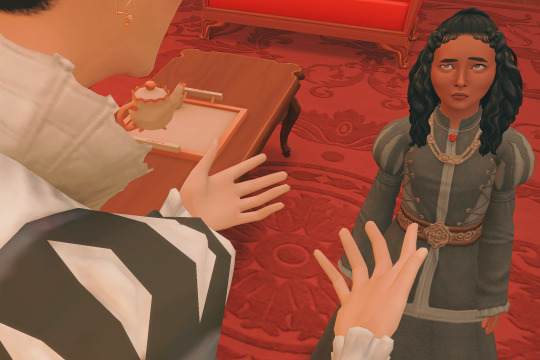
"But, mama, could I not continue my lessons with both you and Lady Margaret?"
"Between your Watcher Guidance lessons with Lady Mary, church and the lessons you will need with me, I doubt you will have the time. Besides, I am sure Frances would benefit from the lessons you have had too."

Margaret fought back her tears. She knew there was no arguing with her mother.
"Very well, mama. May I have one final lesson with Lady Margaret?"
"No," replied Lady Catherine. "We must begin in earnest today."
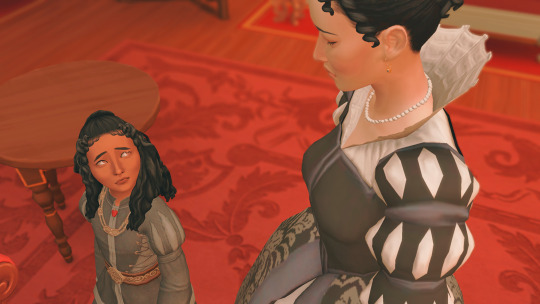
Margaret waited until she could go to bed that night to cry. Her sobs were so heavy that she did not hear the gentle tap at her door.
"Maggie?" whispered Peggy, quietly sliding into the room. When she saw Maggie crying, she rushed to her bedside. "Oh, ma cherie. Ça va aller."
"It's not fair," Margaret cried. "I don't want to be Lady of Newcrest."

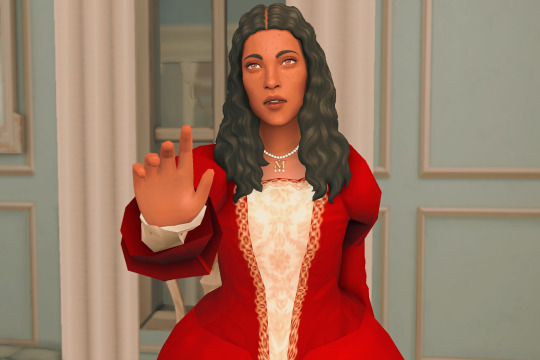
"We first-borns so rarely take up our titles willingly," Peggy consoled. "But, remember, this is a great power and a great honour that we possess."
Maggie sniffed, "It is?"
"Mais, oui! My mama was the Lady of Tartosa before me - a title she took from her mama. She never really cared for it: she let her council run Tartosa while she stayed in Champs les Sims with my papa. But when I became Lady of Tartosa, it felt as if I was fulfilling my destiny. I am no painter, but I knew I could be a good diplomat and leader. And so I left Champ les Sims for Tartosa. I built magnificent buildings. I married highly. I furthered my education. I have seen Tartosa become a respected heart of the sciences and arts. I could not have done any of that if I was the second-born or not even a noble at all."

"And... and I will get to do those things too?" sniffed Maggie.
"You may have to wait until your mama has passed and you are the sole Lady of Newcrest, but yes. You will get to lead and shape that realm into the way you believe the world should be."
"But... but I won't get to see you anymore."
"Nonsense - I may not get to be your mentor, but I am still your cousin. I will be at your wedding. I will visit Newcrest all the time. You will be sick of the sight of me!"
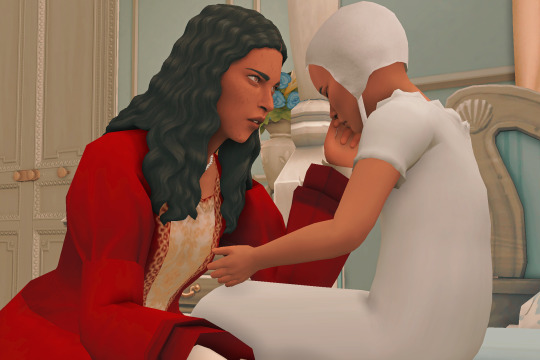
Maggie laughed a little then continued to sob.
"Here," said Peggy, removing the necklace around her neck and pressing it tightly into Maggie's hands. Maggie surveyed the string of pearls with a golden 'M' in awe. "Take this. You are too little to wear it now, but one day you can wear this necklace and remember that I will always be with you and I will always love you. You are my Maggie."
"And you are my Peggy," cried Margaret, hugging Lady Margaret tightly.


Start (Iron Age) | Start (Roman Britain) | Start (Anglo Saxon) | Start (Medieval) | Start (Tudor) | Start (Stuart)
Previous | Next

26 notes
·
View notes
Text
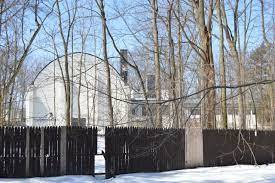


The Hangar Recreation Association
24400 Cedar Rd.
Beachwood, OH
The Hangar, a private recreation center, was built in 1930 as part of the Dudley S. Blossom estate, in what was then Lyndhurst but is now Beachwood, Ohio. Many estates and country houses of that era incorporated a private sports facility, as a place where children, their friends -- and adults -- could swim and play tennis indoors. From the outside, this Cleveland version of a private recreation center does partly resemble an airplane hangar -- because of the two glass-pitched roofs, one each over the tennis court and swimming pool. The plain stucco exterior evokes Art Moderne. Its architect was the highly regarded Abram Garfield, whose father, James A. Garfield, served briefly as the 20th president of the United States before dying in 1881 of wounds from an assassin's bullet. The Hangar shows the fluency that Abram Garfield had. It was the only Art Deco building Garfield would ever create.
Dudley Blossom was a successful Cleveland businessman, but he and his wife are more widely known for their philanthropy, in particular their support of the musical arts. Elizabeth Blossom -- nee Bingham -- was the sister of Frances Payne Bolton, who was married to Chester Bolton, a congressman whose seat Frances would fill upon his death. The Bolton and Blossom estates took up hundreds of acres of the land adjacent to what is now Cedar and Richmond roads. The Blossoms, best known today for the amphitheater named for them in Cuyahoga Falls, the summer home of the Cleveland Orchestra, had a longtime friendship and professional relationship with Abram Garfield.
Garfield, who would found the school of architecture that would be enfolded into Case Western Reserve University, had designed many other homes, including the Mather House at CWRU and the Hay-McKinney Mansion of the Western Reserve Historical Society. He had also designed the Blossoms' Tudor Revival home in Lyndhurst, which was built about a decade before the Hangar was added. The Hangar was his first foray into the design style that had swept the world since the 1925 exhibition in Paris of "arts decoratifs." That exposition debuted a modern style characterized by a streamlined classicism, and geometric and symmetrical compositions. Its prominent motifs often included stylized animals and Aztec or Egyptian references (the latter inspired by the mania surrounding the 1922 discovery of King Tut's tomb).
The Hangar is not open to the public. Today, it is owned by Charles Bolton, whose great-aunt was Blossom's wife, Elizabeth. It is Bolton who oversaw its restoration in the mid-1980s, which was around the same time that the Hangar was listed on January 9, 1986, with the National Register of Historic Places. The Hangar's glory resides in its interior. Guests who arrive in the main lounge are immediately surrounded by a vivid, sea-themed wall mural that leads upward to a sapphire-glass tray ceiling, from which hangs a sleek, silvery chandelier. The mural is signed "June Platt, 1930." Platt's mural at the Hangar shows a mastery of detail and imagination. Sea anemones, guppies, zebra fish and other samples of fantastical marine life swirl in pinks, mint greens and soothing blues, in forms both bold and delicate.
In the 1970s, the membership rolls of the private Hangar Recreation Association read like a who's who of Cleveland's East Side, including names such as Burton, Meacham and Dempsey. Even Sherman Lee, the director of the Cleveland Museum of Art, was an avid tennis-playing member. During the restoration, the Boltons (Charles' wife, Julia, was also greatly involved) salvaged small pieces of wallpaper from protected areas and then had a specialty firm in Cincinnati re-create the original design, using a silk-screen process. The result: walls papered with vintage designs in saturated hues. Today The Hangar is the occasional site of a wedding or a member's private party.
0 notes
Text
ficlet, unfinished
AN: ok so
Based on the TV show Downton Abbey, but I got bored with it. But...this is how I got the idea about waking up as another person in a different period of time. I stole that idea for my Tudor England story about Anne Cresacre...invasion of the body snatchers with time travel I guess.
Her hands curled under her cheek against the back of the chair. Why isn’t this a dream? Tears began to well and she wiped them away briskly. It wouldn’t do to cry, she didn’t have the face for it. She steadied her breath, dried her tears, and took in her surroundings. Opulent surroundings, she corrected herself. Large bookshelves were built into the walls filled with books she wasn’t sure were supposed to be read. But a book now would be a comfort so she arose and walked to the closest shelf. The books were fine, with gold stamped titles on their binds.
Youth: A Narrative and Two Other Stories.
The Varieties of Religious Experience.
The Final Problem.
The Hound of the Baskervilles.
The Call of the Wild.
None of these titles called to her. She was not familiar with them and they would provide no comfort. She wasn’t sure she had ever read anything from this early in the twentieth century and was losing hope she’d find anything familiar to read. Logically, it was too early to lose hope, but that had never stopped her before so she saw no reason for it to stop her now.
Her fingers continued to trace along the books, looking for a familiar title. She’d take anything.
The Life and Opinions of Tristram Shandy, Gentleman. Hamlet.
Master and Commander. If that one had even been published yet.
Persuasion
PERSUASION - Her thoughts screamed. Of course. She had a beautiful pink copy with lilac pages and a silk bookmark at home. And there upon the shelf Persuasion sat. Not for long. A burgundy colored book, gold stamped title and a paisley inside cover. She was nearly all hope and nearly no agony now, with this book in her hand. She chucked to herself, and with that, she returned to the stately chaise lounge. This? She could get used to this, being left alone in a beautiful room with a thousand and one books to read. Perhaps she’d even finish Nana. If it had even been published yet.
***
THE SEASON
Fall 1910
Being who she was, she was still allowed a Season in London. To be honest, the privilege surprised now-Edith. She stood now before a three sided mirror on a small rise, a harried tailor's assistant working at the hem of her new dress. One of her new dresses, she gleefully corrected herself. When she had asked now-Father for a new wardrobe, he'd acquiesced. Sister-Mary had gotten all new clothes last year, so why not me?
The smell of cinnamon wafted through the air. How hard would it be to ask the tailor to let out her dress? How hard to adjust her corset? What would, she pondered, allow her another delicious cinnamon roll? A third delicious cinnamon roll.
It's the time of flabby women. she justified to herself, eyeing the rolls shamelessly. And, it was. Leisurely exercises dominated her time outdoors, leaving her merely rosy cheeked. Women did not sweat here, nor did they exert themselves. Women were not toned, and zaftig girls were considered as beautiful as sister-Mary—perhaps more so to some men.
Now-Edith did not have the same luck. No one thought she was beautiful, lovely, or charming or otherwise. In 2002, she'd blossomed with large breasts and broad hips. Now? Despite her best efforts, she remained slender and boyishly hipped. She’d been pale then, and she was pale now. That was the same. She had heavier set eyelids, the left marred by blemishes. Blemishes she'd gotten long since gotten used to. She avoided the color brown, powdered her face lightly, and hoped for the best. It wasn't too bad, but in truth she'd gotten used to looking this way.
But, whatever. Her new dress formed on her body with the help of the tailor and his assistant. She was more concerned with this now that she admired the dress again in the mirror. This dress would be for the afternoon, rendered in a tone on tone green striped fabric. She smoothed the front down, feeling the soft cotton poplin under her fingers. She clutched it softly between her pointer and thumb marveling in the texture.
A dress! She smiled at the thought – if there was no book, she’d take a dress. No dress, she’d take a lemon tart. Frivolities, she knew. Six years of living as a landed gentry separated her from her old life. She thought very little of politics now, little of the suffering of people and of the hoarding of capital. It was immaterial to her.
In fact, the most material thing to her at this point in time was convincing now-Mother and now-Father to allow her a dress of fine yellow damask. Neither sister-Mary nor sister-Sybil had anything like that. And, if they had the best looks of the girls why should now-Edith not have the best clothing? She had the best room of all her sisters, won with tears and pleading. She had more shoes, more gloves, and finer hats than her beautiful sisters. Won with tears, pleading, and an excellent academic performance. But, the dress of fine yellow damask? That eluded her. Like home. But she pushed that thought down.
She grabbed a third cinnamon roll from the serving plate upon which they sat and bit in.
“Honestly, Edith,” sister-Mary entered now-Edith’s room and continued, “There are colors other than green that suit you. Perhaps brown?” She sauntered to the large bay window and sat at its seat. The sunlight made her deep brunette hair shine.
“Green is my best color,” now-Edith replied.
“Yes, and I suppose that is your best face?” Sister-Mary didn’t bother to look at now-Edith.
“Can you go? I’m bored now,” feigning indifference worked, sometimes well, sometimes less well, but eventually sister-Mary would get bored and leave. Deprived of satisfaction, and later missing a treasured item from her bedroom. This afternoon, it was one of those missing items that had brought sister-Mary where she didn’t belong, within now-Edith’s eyesight.
The hat pin was long drowned in a lake just outside of Downton. It’d been a pretty hat pin, accented with a white pearl on the end. Delicious, beautiful, a pity I can’t keep it for myself, now-Edith had thought when she threw it from the moving car. Whenever she lacked wit, she had rank malice.
“Your hat pin is long, long gone,” now-Edith simply stated.
“No matter, Papa will buy me another one. He always does, without question,” sister-Mary shrugged. Now-Edith seethed with jealousy – she performed with a different sort of arsenal.
“Yes, without question. But, I wonder when Papa will get bored of replacing all of your things?” Now-Edith continued, “I wonder when Papa will order you to marry the man sitting next to you at dinner? I mean,” now-Edith chortled, “I wonder when Papa -”
“We all feel sorry for you, Edith,” sister-Mary interrupted, “You’re an ugly, pathetic thing lacking shame. Go on, finish your cinnamon roll.”
Now-Edith lightly tossed the once bitten bun back to the serving plate, “I’m fine, thank you. You put me off my feed. Why are you here? Other than your hat pin.”
“I was curious to see your new dress,”
“Curious? Or in need of fashion inspiration?”
Sister-Mary looked at her now, “Why would you inspire me? Whatever can I learn from you?”
“Wit?” Now-Edith let the word hang. It was an unwarranted boast – she knew. Sister-Mary was just as witty and just as malicious as now-Edith was. Perhaps they’d be friends if they hadn’t been sisters.
“I don’t need lessons in wit from you.”
“Nor lessons in unkindness, fashion, or otherwise,”
“Precisely,”
“I’m struggling to figure out why you’re here. I’m bored with you, Miss Simpson is nearly done pinning the skirt of my dress - ”
“You struggle with most things.”
“That is what you came in to tell me? You’re wasting my time. Does this amuse you?”
“A little,” sister-Mary raised her chin slightly. She rose from the window seat, smoothing the back of her floral dress, and made her way to the door. “Oh, yes,” she said when she reached the door frame. “I remember exactly why I stopped by now,” sister-Mary’s brown eyes bored down on now-Edith in the mirror. “Papa says Cousin Patrick is to escort you to London.”
And cousin-Patrick did.
0 notes
Text
by saturday 22nd july 2023, JUMBO shop floor, afternoon, A1. 'sydney sweeney has got a younger sister, perhaps 12 of age, same height as Selena Gomez younger sister, same eyes of her older sister, both. B1. Selena Gomez has got a younger sister, perhaps 1.60cm, same chestnut eyes as her older Selena Gomez. she was w/ someone, and hugging as giving thanks, for the shopping cart mebbe, so i could only see her head turning to me and catching my eyes, me catching her look, so we have got the look!! for three seconds, then they left, was POS 8 downstream, perhaps three meters away, or less than five. C1. Dario Lopez of NYC, the U.N. dropped by (sort of), they were USA, done GYM and muscle building, and a lady (perhaps NAVY JAG that Taylor Hill must had had entered pan friend and letters sort of relationship during 2019, at NYC). their style was copied from Cristi Hrituc, hubby of Ana-Maria lawyer at Bucharest and Greek ethnic minority. so t'was like a fast walking tour, browsing allegretto, and they caught me following for ten meters, and thus his 'mom in law, the NAVY JAG lady's mom (old woman, nose like vulture), dyed hair, returned once Selgros shopping also done, and kids awaiting for her outside, had left her trekking the JUMNBO a 2nd time, alone. NEWS of U.N. NYC NYC but somewhat the Security Council, not Andrei Voicu financial background. eitherway, a deep studied very short and fast reveal, so that to prevent me start crying, sniffing, or becoming emotional. handing over the torch, carrying the light passing the light, smth like that. D1. Dorobant Bogdan, very much looking like the Insta profile of the 'dariolopez74, perhaps a younger brother of Dorobant Bogdan of same class in school w/ Allen Coliban (the Mayor) and my girl cousin Polixenia Diamantidi, of Greece nowadays. Dorobant Bogdan was 2012 Shop manager DECATHLON Brasov. then mebbe those pics of his very close relative and fake Insta profile revealed tonight hereinunder, 'dariolopez74. married to wife, who looked like some of the ladies sort of depicted onto that fake Insta (that joke of a story). E1. Alina Paraschieva, married and two kids, two little daughters, blondie and green eyes, the cashier at Admiral NOVOMATIC, 2011-2012, night shifted only, could not find her profile fcbk online whatsoever, same approach as Miranda Kerr ten days ago, she was with her family and husband, she let me know the OTHER HER of a three weeks ago, i had approached and smiled and talked to so freely, was her younger sister from COVASNA, also married, and that sister was indeed same o same o MY CASHIER LADY of Admiral NOVOMATIC of the 2011, twelve years ago. sisters, sliding doors, yet i was TODAY seeing a Miranda Kerr body built mom of two, not her suave sister of the age of twelve years ago. CANNOT find her Brasov page online, btw. YET we made eye contact and she left me note by the trollers, where hubby would not had looked, nor aware. F1. LIV MADDIE and LIZZIE, the DOVE fan account, she just like in the pic of yesterday where i was saying I LOVE YOU to younger DOVE by the left. purple color lettering, wearing light denim, same hair length and shaded color, same like in that picture, nothing changed, even her legs, strong, able carrying me if so needed. strong woman, physically. wearing same nose, and i knew of her only when she technically profiled and passing my sharp ONE O'CLOCK. G1. Tg.Mures Hungarian HU sketch lady related mebbe to E.T. classmate of Aprilly Lajos College, 2004-2005. one of the three, and whose older sister 'kissankana left for Sweden on PH vip movies adventure. H1. younger girl cousin of E.T. the Danube river Swiss cruises of 2013-2014, same what PH vip Angel today 'verobuffone, did w/ aid of 'emmacruises, later on, by 2021-2022. before the plastic titties she now has gotten. A, B, C, D, E, F, G, H, and some more ladies representing moms and grannies, dropped by JUMBO shop floor today on a Saturday, incl several Jewish families, and also I1. Tudor, plant manager Prodlacta Inc, married to a fine green eyes, Moldova wife, young sexy 2019. m
0 notes